SEPTEMBER 2024 | VOLUME 33, NUMBER 7
2024-25 Austin Bar President’s New Initiative: “Stop the Stigma”
The Austin Bar Association is launching the “Stop the Stigma” campaign, an initiative of 2024-25 President Mary-Ellen King, to destigmatize mental health substance abuse struggles, as well as raise suicide prevention awareness in the legal profession.
The two tentpoles of this new campaign are the newly launched Stop the Stigma podcast, as well as increased efforts to recruit authors to write about these topics for Austin Lawyer.
“This campaign is important to me because, in 2023, I lost my ex-husband, ex-law partner, and the father of my son to substance abuse,” King said.
Lawyers are 22 times more likely to contemplate suicide than other professions.1
The podcast, hosted by King, is meant to highlight stories of lawyers who are in recovery, including what support helped them the most and how they found that support, and ultimately to teach others how to overcome their own struggles.
A frequent and valid concern for many who struggle with mental health or addiction issues is the fear that their struggles will be made public. Theoretically, this may result in loss of business, claims of ineffective assistance of counsel, and/or perhaps retrials or vacating of previous cour decisions.
To mitigate these concerns, many of the media pieces that come out about these topics are anonymously authored, such as the “Stories of Recovery” series of the Texas Lawyers Assistance Program (TLAP). This critically valuable series of articles is authored by lawyers and law students in recovery from addiction and/or mental health problems but their identities are concealed.
While this concern is understandable, the Stop the Stigma podcast (as its name suggests) is interested in stopping the stigma around these conversations by featuring individuals who are open about their struggles. By normalizing these discussions, we can stop the stigma for those enduring private battles.
But we need your help.
If you are interested in appearing on the podcast or writing an article for Austin Lawyer, please contact Communications Director Billy Huntsman at billy@austinbar.org. If you know someone who may be interested in appearing on the podcast or writing an article, please encourage them to reach out.
Most importantly, if you or someone you know is struggling with addiction or mental health issues, please reach out for help. All communications with TLAP are confidential by law, per Texas Health and Safety Code Section 467.2 All you have to do is call or

text 1-800-343-TLAP (8527) to get connected.
If you are concerned about the cost of treatment, the Austin Bar Foundation administers the Judge Mack Kidd Fund. This fund provides financial assistance for counseling and medical treatment for Austin attorneys and UT Law students suffering from depression or related illnesses. Visit https:// www.austinbar.org/?pg=justice-mack-kidd-fund to learn more.
The Austin Young Lawyers Association Foundation also administers the Personal Crisis Assistance Program (PCAP) to provide temporary financial or practice assistance in personal crisis situations. PCAP can provide up to $1,500 in grant funds to assist an attorney who is unable to fulfill certain practice-related financial obligations because of a personal
crisis. If your practice is struggling because of a personal emergency, PCAP can also facilitate attorney volunteers to handle professional matters for an affected lawyer during a crisis. If you are in the midst of a personal emergency, please reach out to AYLA Executive Director Debbie Kelly (debbie@austinbar.org).
Like TLAP, both the Judge Mack Kidd Fund and PCAP are strictly confidential programs. Do not be afraid or ashamed to ask for help. Together, we can change the conversation around mental health and addiction and stop the stigma. AL
ENDNOTES
1 https://www.mdpi.com/22279032/11/4/536. 2 https://shorturl.at/6VVKZ.
Trusted by 50,000 law firms, LawPay is a simple, secure solution that allows you to easily accept credit and eCheck payments online, in person, or through your favorite practice management tools.





AU ST INL AW Y ER

twitter.com/theaustinbar
NEWS & ANNOUNCEMENTS
Suicide Awareness Fundraiser
The Lawyer Well-Being Committee of the Austin Bar will participate in the Out of the Darkness Community Walk, a fundraiser on behalf of the American Foundation for Suicide Prevention. Visit shorturl.at/PSAen to learn more. FOLLOW instagram.com/theaustinbar
Sept. 10 Labor & Employment Section CLE: “Actionable Adverse Employment Actions Under Title VII” Noon – 1:00 p.m. Zoom Register at austinbar.org.


https://www.linkedin.com/ company/austin-barassociation
vimeo.com/austinbar
ADDICTION & MENTAL HEALTH RESOURCES
24-Hour Suicide & Crisis Lifeline - 988 - call or text | Live chat: SuicidePreventionLifeline.org
Texas Lawyers’ Assistance Program (TLAP) - 1-800-343-8527
TLAP is a 24-hour confidential crisis counseling and referral program to help lawyers, law students, and judges with substance use and mental health issues.
Justice Mack Kidd Fund
The Austin Bar Foundation administers the Justice Mack Kidd Fund, which can provide financial assistance to individuals seeking treatment for depression or similar illnesses. Visit austinbar.org/?pg=justice-mack-kidd-fund to learn more.
Personal Crisis Assistance Program (PCAP)
The Austin Young Lawyers Association Foundation provides grants and/or peer support for individuals suffering from a personal crisis.
Contact Debbie Kelly: 512-472-0279 x 105
Sheeran-Crowley Trust
Administered through TLAP, the trust provides financial help to Texas attorneys, judges, and law students who need treatment for substance use, depression, and other mental health issues. Visit sheerancrowley. org to learn more.
Alcohol & Drug Abuse
Austin Drug & Alcohol Abuse Program - 512-454-8180
Alcoholics Anonymous - 512-444-0071
Cocaine Anonymous - 512-479-9327
Narcotics Anonymous Counseling - 512-480-0004
Psychiatric Emergencies
Emergency Screening in a Psychiatric Crisis 24/7 - 512-472-4357
Samaritan Center (provides professional counseling services on a sliding scale) - 512-451-7337

AUST INL AW Y ER AL AL
OFFICIAL PUBLICATION OF THE AUSTIN BAR ASSOCIATION
AUSTIN BAR ASSOCIATION
Mary-Ellen King President
Maitreya Tomlinson President-Elect
Judge Maya Guerra Gamble Secretary
Rob Frazer Treasurer
Justice Chari Kelly Immediate Past President
AUSTIN YOUNG LAWYERS ASSOCIATION
Emily Morris President
Jenna Malsbary President-Elect
Gracie Wood Shepherd Treasurer
Lena Proft Secretary
Sarah Harp Immediate Past President
Austin Lawyer
©2024 Austin Bar Association; Austin Young Lawyers Association
EXECUTIVE OFFICES
712 W. 16th Street
Austin, TX 78701
Email: austinbar@austinbar.org
Website: austinbar.org
Ph: 512.472.0279
DeLaine Ward Executive Director
Debbie Kelly Associate Executive Director
Rachael K. Jones Editor-In-Chief
Abigail Ventress Assistant Editor
Roslyn Dubberstein Assistant Editor
Billy Huntsman Managing Editor
Austin Lawyer (ISSN #10710353) is published monthly, except for July/August and December/January, at the annual rate of $10 membership dues by the Austin Bar Association and the Austin Young Lawyers Association, 712 W. 16th Street, Austin, TX 78701. Periodicals Postage Paid at Austin, Texas. POSTMASTER: Send address changes to Austin Lawyer, 712 W. 16th Street, Austin, TX 78701.
Austin Lawyer is an award-winning newsletter published 10 times a year for members of the Austin Bar Association. Its focus is on Austin Bar activities, policies, and decisions of the Austin Bar board of directors; legislation affecting Austin attorneys; and other issues impacting lawyers and the legal professionals. It also includes information on decisions from the U.S. District Court for the Western District of Texas and the Texas Third Court of Appeals; CLE opportunities; members’ and committees’ accomplishments; and various community and association activities.
The views, opinions, and content expressed in this publication are those of the author(s) or advertiser(s) and do not necessarily reflect the views or opinions of the Austin Bar Association membership, Austin Bar Association board of directors, or Austin Bar Association staff. As a matter of policy, the Austin Bar Association does not endorse any products, services, or programs, and any advertisement in this publication should not be construed as such an endorsement.
Contributions to Austin Lawyer are welcome, but the right is reserved to select and edit materials to be published. Please send all correspondence to the address listed above. For editorial guidelines, visit austinbar.org in the “About Us” tab.
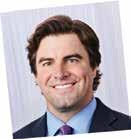













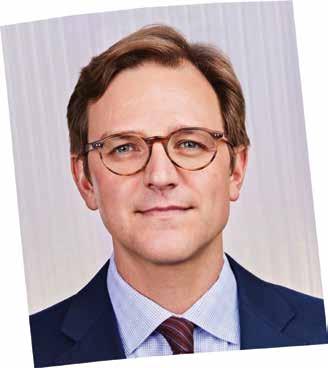




Iworked with Justice Mack Kidd on the Third Court of Appeals for 10 years in the 90s. He was invariably jovial and upbeat. But he had a secret that few people knew about: He and some other members of his family of origin suffered from depression. A few years after I left the Court in 2001, I heard Judge Kidd had died. I was shocked and saddened but nowhere near as much as when the pastor at his memorial service ended her eulogy with the words, “Don’t judge Mack by his last act.” It took me a few minutes to figure out what she meant, but I soon got confirmation that he had taken his own life.
Judge Kidd had been a member of the Calvert Inn of Court, and at the monthly Inn meeting a couple of weeks after his death, I found that I was not the only one in shock. Led by Pastor Joe Parker, the group decided we had to do something constructive to honor Judge Kidd
The History of the Justice Mack Kidd Fund
BY HON. WOODIE JONES, THIRD COURT OF APPEALS (RET.)
and to help others. Through our discussions, we learned that lawyers suffering from serious depression often find it difficult if not impossible to get any work done. As a result, their income dries up. As their income decreases, they often can’t afford therapy or medication to treat the disease. Sometimes they also lose their health insurance, which makes their financial situation even more dire. And of course, the financial stress deepens their depression and feeling of hopelessness.
Members of the Calvert Inn decided to establish a monetary fund to try to alleviate some of these financial hardships for those in need. With Judge Kidd’s widow’s approval, we called it the Justice Mack Kidd Fund. Working with the Texas Lawyers Assistance Program (TLAP) of the State Bar, which has a similar statewide program, we established a procedure for making grants to attorneys living or working in Travis County who are in financial distress due to depression or a related illness. Many of the referrals the Fund gets come from applications made through TLAP.
The Fund is administered by the Austin Bar Foundation. The initial grant amount available is $2,500, but the Fund will entertain a second application if it is needed.
I am proud to have been one of the trustees of the Fund since its creation almost 20 years ago. Us -

There is no shame in asking for help when you can’t seem to find your way out of the fog. The Justice Mack Kidd Fund is there to provide a lifeline. Please use it.
ing money from voluntary contributions made by the Austin legal community, we have helped many local lawyers work through depressive episodes. It is something we can all be proud of.
But many Austin lawyers do not know about the Justice Mack Kidd Fund or TLAP. And many people do not realize how serious (and deadly) depression can be. It seems that every year at least one Austin lawyer takes his or her own life.
I get it. For those who do not suffer from serious depression, the disease can seem like a mysterious and distant condition. But it is very real and often closer than we realize. It is all around us, though usually hidden, just like Judge Kidd’s.
I encourage you to partner with the Justice Mack Kidd Fund. All contributions to the Fund are tax-deductible as charitable donations. To donate online, visit https://shorturl.at/qYoRI. To make a donation by mail, send a check
to 712 W. 16th St., payable to the Austin Bar Foundation, Attn: Judge Mack Kidd Fund. Just as important, though, you can partner with the Fund by being aware of and sensitive to the issue or by just letting others know about the existence of the Fund. You can also partner with the Fund by noticing changes in the behavior of a friend or colleague and telling them about the Fund if that seems appropriate. Or you can report behavior that appears to indicate depression directly to the TLAP office of the State Bar yourself. Such communications are 100% confidential by law. Your act of caring, even if it makes you feel uncomfortable, could start a crucial healing process.
Just as important, do not forget to take care of yourself. There is no shame in asking for help when you cannot seem to find your way out of the fog. The Justice Mack Kidd Fund is there to provide a lifeline. Please use it. AL


















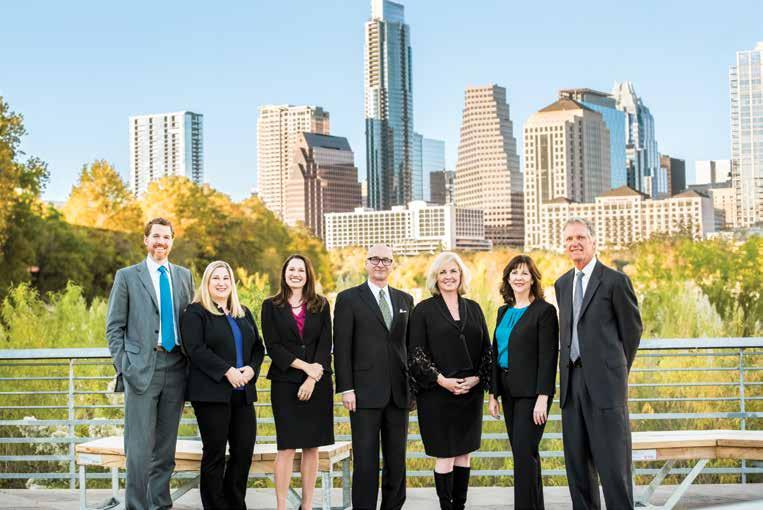
Stories of Recovery: Hope Over Fear
Editor’s Note: This article was reprinted with the permission of the Texas Lawyers’ Assistance Program (TLAP). TLAP offers confidential assistance for lawyers, law students, and judges with substance use or mental health issues. Call or text TLAP at 1-800-343-TLAP (8527) or find more information at tlaphelps.org.
At the ripe age of 41, my entire life has been leading up to the moment I hear, “Welcome to the Bar of Texas.” Although I successfully completed law school and passed the Texas Bar Exam, I have yet to hear those affirming words. Half a year ago, my application to join the Bar of Texas was denied. This denial could have been a definitive end to my aspirations, yet I chose to appeal the decision, facing a new challenge before the Texas Board of Law Examiners to prove my character and fitness.
The denial was a devastating blow, echoing the toughest moments of my life. Imagine the weight of years of sacrifice feeling suddenly futile—my time in military service overseas, the balancing of a busy family life with five children, and the grueling academic pursuit all seemed in jeopardy. But I am fighting to keep the spirit of my all-time favorite movie, A Knight’s Tale, and continue to believe, as William Thatcher
believed, that “a man can change his stars.”
At the age of 17, I dropped out of high school. By 20, I was about to become a father for the third time. With no education beyond high school, no job skills, and feeling like I had no real value to offer, I was far from where I wanted to be. But like William Thatcher, who rose from a humble squire to a celebrated knight, I knew I needed to rewrite my story. I joined the Army, which instilled in me discipline and a drive to pursue something greater. This marked the beginning of my transformation from what felt like a nobody to someone striving for nobility.
While I am no longer 20 or in the Army, it is 20 years later, and I feel like history is repeating itself. I am back in a position where I have to prove myself, make changes, and prepare for what feels like the biggest obstacle of my life. The preparation has involved more than just legal study. I filled my schedule with community service, aligning my actions with the core values of the legal profession. I compiled examples of my integrity, professionalism, and resilience, and my colleagues at the personal injury firm where I work, along with my mentors from law school, generously provided testimonials to my ethical conduct and dedication. This multi-angled effort was about proving my worthiness to serve justly and honorably as an attorney.


“Information is power, the not knowing is devastating.”

Simultaneously, the encouragement I received from TLAP and the veteran community was invaluable. Their support affirmed that a setback is merely a part of a larger narrative, not the conclusion. That a setback is a setup for a comeback. Hearing stories of others who have faced and overcome similar challenges boosted my resolve and injected hope into my preparations. This period of adversity became a profound learning experience, teaching me that every challenge, whether in combat or in court, offers valuable lessons and growth opportunities.
As the hearing approaches, I am fortified by a deep-seated hope and the collective strength of my community. The possibility of finally hearing, “Welcome to the Bar of Texas” remains a powerful motivator. This journey has taught me the
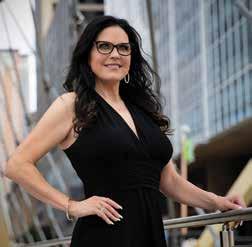
importance of perseverance, the value of community support, and the power of a hopeful outlook. These lessons have prepared me to advocate not only for myself but also for others who face their own battles within and beyond the legal system.
To those who are navigating obstacles, whether they be professional setbacks, personal trials, or both, remember this: Our challenges do not define us; rather, our response to them does. We are shaped by our ability to persevere through adversity, supported by the belief and encouragement of those around us. No matter the outcome of my hearing, I am committed to continuing my journey, striving to uphold justice and advocating for those in need. AL


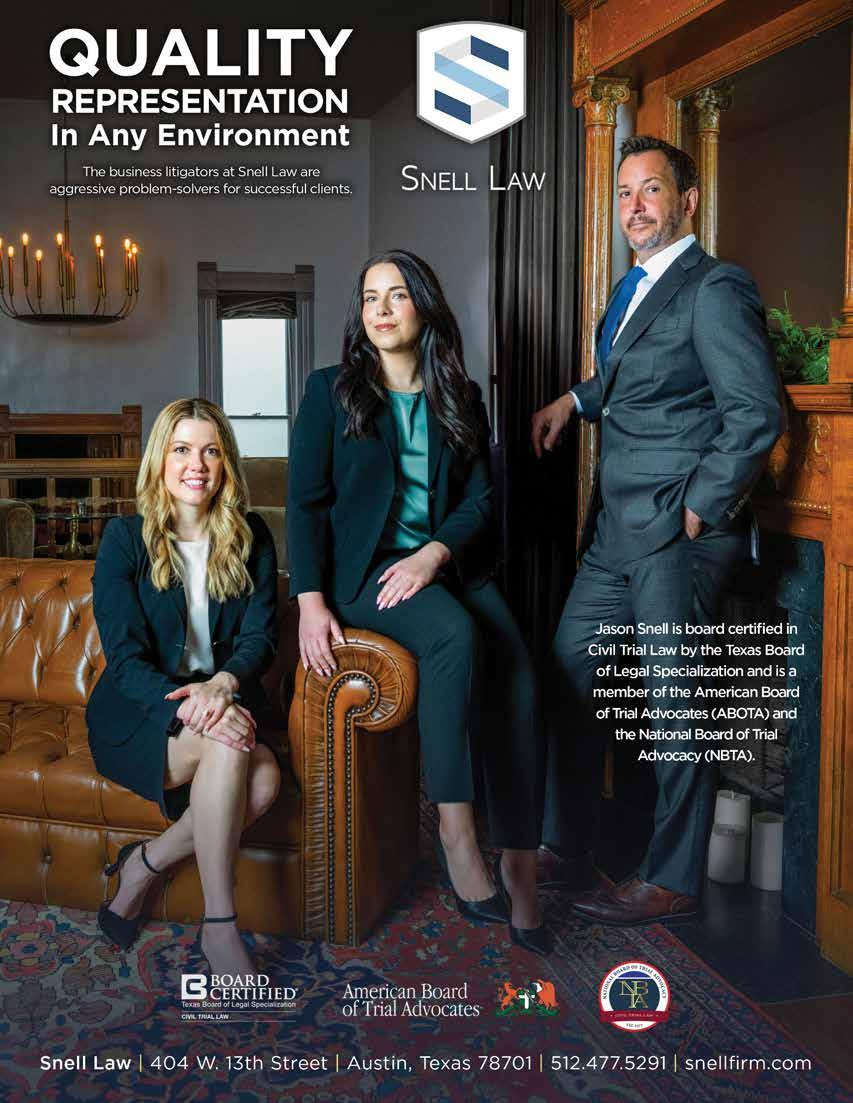
New Members
The Austin Bar welcomes the following new members:
Josue Alvarenga
Nicholas Antaki
Scott Butler
Daniel Cooper
Bryan Cruz
Molly Davis
Kristine Devine
Alexis Gonzales
Cameron Green
Claudia Gutierrez
Nadia Haghighatian
David Herrold
Jessie Horn
Cody Huffman
Marc Jones
Natalie Kuo
Amy Lefkowitz
Erica Martinez
Leah Martino
Matthew Mueller
Adrianna Perez
Ryan Pitts
Katherine Pfau
Graham Pough
Emily Spjut
Klaudia Velazquez
Christian Villanueva
Julie Young







year-end celebration. The firm has a year-end break between Christmas and New Year’s that allows employees to spend time with family and come back refreshed in the New Year. Remote work is also an option.
Munsch Hardt Kopf & Harr is a Texas-based, mid-sized, full-service law firm. Munsch Hardt offers 401(k) and profit-sharing plans, paid parental leave, fertility benefits, generous paid time off, and happy hours.
ON THE MOVE
Congratulations to Glorieni Azeredo, who has joined Barron, Adler, Clough & Oddo. In her career, Azeredo has brought five cases to jury trial, secured two appellate victories, and participated in hundreds of special commissioners’ hearings. She previously served as the Houston-area team lead for the Texas Attorney General’s Office’s Transportation Division. She is a graduate of Baylor Law School.
Congratulations to Scott Herlihy, who has launched his solo practice in Westlake Hills. Herlihy handles a wide range of family law matters including divorces involving high-asset and more modest estates, custody and conservatorship, pre-nuptial and post-nuptial agreements, enforcements, and modifications. He also handles select civil litigation cases. Herlihy is a graduate of St. Mary’s School of Law.
Congratulations to AnneMarie McComb, who has been named partner at Snell Law. A former personal injury litigator, McComb turned her focus to civil and commercial litigation since joining Snell. She is admitted to practice in all Texas state courts and the U.S. Western District of Texas. She is a graduate of Baylor Law.
Congratulations to Francisco Montalvo, who has joined Bollier Ciccone as a litigation associate. Montalvo has experience on both
sides of the docket, litigating various personal injury, insurance defense, and coverage-related matters. He is a graduate of the University of Houston Law Center.
Congratulations to Kevin Brown, Andrew Vickers, and Tori Harrison, who have joined DuBois Bryant & Campbell LLP’s litigation practice. Brown is a graduate of The University of Texas School of Law, and his practice focuses on business, media and intellectual property litigation. Vickers is also a graduate of The University of Texas School of Law, and his practice focuses on real estate and fiduciary litigation. Harrison is a graduate of the University of Houston Law Center, and her practice focuses on business and employment litigation. Previously, the three worked at Holland & Knight LLP and Waller Lansden Dortch & Davis LLP.
KUDOS
Congratulations to the following firms, which were included in Austin Business Journal’s “2024 Best Places to Work” list:
Goranson Bain Ausley is the largest law firm in Texas exclusively practicing family law and is recognized as one of the most respected family law firms in Texas. The firm’s culture committee organizes office events that seek to recognize and celebrate its employees, including a Great Day of Service, Paralegal Day, Fun Fridays, and a
Perkins Coie’s Austin office serves innovative companies and entrepreneurs across the Lone Star State. In addition to traditional insurance benefits, employees receive profit sharing, financial planning services, tuition reimbursement, student loan refinancing, qualified retirement program, and matching employee retirement contributions. Paid leave includes sabbaticals.
Pillsbury Winthrop Shaw Pittman is an international law firm with a focus on the technology and life sciences, energy, financial, and real estate and construction sectors. Pillsbury people thrive in a high-performance environment. Benefits include paying new parents 100 percent pay for 12 weeks and the Lyra Health program, which provides up to 16 free sessions for counseling, coaching and therapy for the employee and each member of their household. AL

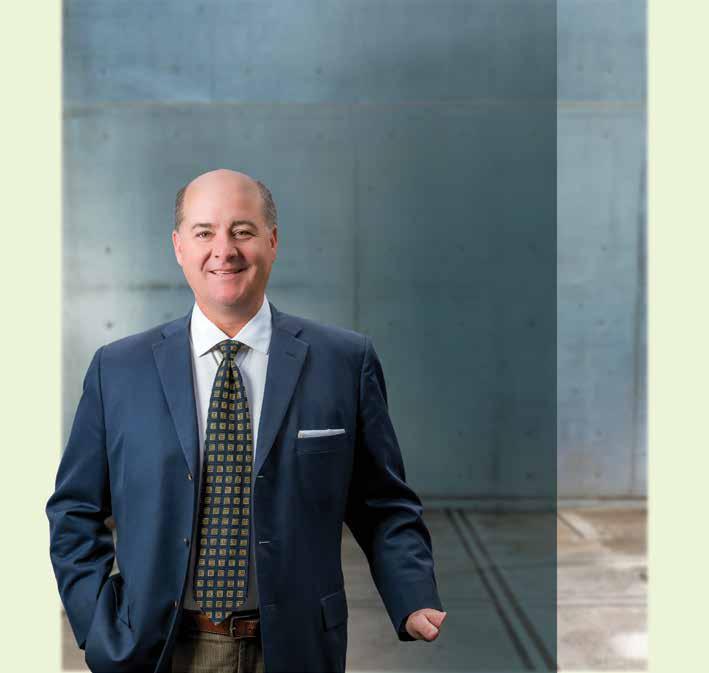


PRESIDENT’S COLUMN

With August and September comes a new school year and a new bar year! AYLA has lots in store as always, and we are excited to build on its legacy of excellent community service, professionalism, and fun. This new bar year is especially significant for me both personally and professionally, as the beginning of my term as AYLA president coin-
AYLA Events
BY EMILY MORRIS, POWERSCHOOL
So This is the New Year
cides with welcoming a new baby into our family in a few weeks. While the timing is not easy, I am grateful to our board members, including President-Elect Jenna Malsbary and Treasurer Gracie Sheppard, and Executive Director Debbie Kelly, for their support and willingness to step up during this time of transition, so I can take time to heal and be with my family. I am also grateful to have examples of successful mother attorneys in bar leadership like Justice Chari Kelly and Mary-Ellen King who have offered their guidance and support.
Some themes AYLA is focusing on this coming year are mentorship, collaboration, and whole-person support. AYLA is a natural place for professional development opportunities and com-
CASA Superhero run – Sunday, Sept. 22, 2024
AYLA Judicial Reception – Thursday, Sept. 26, 2024
AYLA Docket Call – Thursday, Oct. 17, 2024
AYLA Tailgate Fundraiser – Saturday, Nov. 9, 2024 –UT vs Florida Gators
AYLA Health & Wellness Cycling Class – Saturday, Nov. 16, 2024
AYLA Docket Call – Thursday, Nov. 21, 2024
AYLA Holiday Event – Sunday, Dec. 8, 2024 - tentative
AYLA Holiday Docket Call – Thursday, Dec. 12, 2024
AYLA Docket Call – Thursday, Jan. 16, 2025
AYLA MLK Day Of Service - Monday, Jan. 20, 2025
AYLA Docket Call – Thursday, Feb. 20, 2025
AYLA Diversity Bar Mixer – Thursday, March 13, 2025
AYLA Crawfish Boil – Saturday, March 29, 2025
Bench Bar Conference – Friday, April 11, 2025
AYLA Docket Call – Thursday, April 17, 2025
AYLA Docket Call – Thursday, May 15, 2025
AYLA will schedule 4 CLEs during the bar year. The “Freshquires” program will also continue this bar year. Please check our website for monthly events: www.ayla.org.
munity engagement. We can have an even greater impact by working together with other bar-adjacent and cross-industry groups and by helping our members be the best version of themselves for their jobs, community, and families. These themes will be incorporat-
ed into our CLEs, “Freshquires” program, Docket Calls, and other programs throughout the year. While we do have plans underway, we also welcome ideas for additional opportunities in these areas, so feel free to reach out to me or Jenna with new suggestions. AL
AYLA is Here to Help!
Is your practice suffering because of a personal crisis? Are you enduring tough times, but do not know where to turn? The Personal Crisis Assistance Program (PCAP) is here to help in your time of need.
PCAP was created in 1996 to support Austin-area attorneys who face an immediate need for temporary financial or practice assistance due to a personal crisis. The objective of this program, funded by the Austin Young Lawyers Association Foundation, is to serve as a protection for lawyers and their clients when personal emergencies harm a lawyer’s practice. PCAP is available to attorneys who work or reside in Travis County and who are eligible for regular membership in AYLA.
PCAP includes two levels of short-term assistance for lawyers in crisis:
• Financial – PCAP provides limited grant funds of up to $1,500 to assist an attorney who is unable to fulfill certain practice-related financial obligations due to a personal crisis.
• Practice-Related – Attorney volunteers agree to handle professional matters for the affected lawyer during the crisis.
To apply confidentially for financial or practice assistance, please contact Debbie Kelly at 512-472-0279 x105 or by email at debbie@austinbar.org. Regardless of how overwhelming the problem may seem, help is available. You have worked hard to build your career – PCAP is here to help you get back on your feet. AL
UPCOMING EVENTS
SUNDAY, SEPT. 22
CASA Superhero Run/Walk 8:00 - 9:00 a.m. Circuit of the Americas give.casatravis.org/team/586144
THURSDAY, SEPT. 26
AYLA Judicial Reception 5:30 - 7:30 p.m.
Chateau Bellevue 708 San Antonio St. RSVP at shorturl.at/p6hYv.
AYLA Committees Want YOU!
Fall is a fantastic time to join the Austin Young Lawyers Association (AYLA)! Join now for 2025 and you’ll also get the rest of 2024 free!
Joining an AYLA committee is the perfect way to get involved and meet fellow attorneys. AYLA members can join any of the following committees:
The Crawfish Boil Fundraiser Committee plans and organizes an annual crawfish boil fundraiser each spring.
The Bench Bar Committee helps plan the annual day-long CLE hosted jointly by the Austin Bar and AYLA.
The CLE Committee plans and
organizes quarterly continuing legal education for AYLA members.
The Community Service Days Committee provides lawyers and non-lawyers with periodic opportunities to volunteer for non-profit organizations. The community service events provide an opportunity for lawyers to make a relatively small time commitment (usually just a few hours on one day) while being exposed to various charitable organizations and meeting other members of the legal and non-legal community.
The Day of Service Committee coordinates multiple community service events on MLK Day, in honor of Dr. Martin Luther King, Jr.
The Docket Call Committee
hosts a monthly happy hour for AYLA members. This event is the gateway event for many of our members, as nearly everyone’s first experience with AYLA is a Docket Call.
The Health and Wellness Committee is focused on lawyer well-being through group exercise and promoting healthy lifestyles. The committee aims to bring law yers together in monthly activities such as running, biking, hiking, swimming, etc. Get to know other lawyers in an environment out side of the office or courtroom.
tee resources to provide special holi day gifts and informative materi
als to Austin-area families in need.
The Judicial Reception Committee hosts a reception for AYLA members to interact with members of the judiciary.
The Law-Related Education Committee plans and implements various educational programs aimed at school-aged children.
Freshquires Committee plans networking opportunities and CLE for new attorneys in
To volunteer with any of AYLA’s committees, please
“Freshquires” Continues to Build on Its First-Year Successes
For many lawyers, the formative experiences of the first years of practice teach a lot that law school cannot. Also key are the in-person connections made in law school—the start of professional networking. But for many young Austin-area lawyers, those first steps were either cut short or taken away altogether by COVID-19 and its fallout.
Enter “Freshquires.” Born out of the leadership goals of Austin Bar and AYLA past presidents, and generously funded by a grant from TYLA, “Freshquires” provides community for Austin-area lawyers in their first three years of practice. The program holds monthly, attendance-capped events for newer lawyers to learn the essentials of litigation and transactional practice, often for CLE credit, and to build their networks of peers and mentors.
In September, the “Freshquires” program will be accepting a fresh crop of newly licensed or soon-to-be licensed attorneys, and will help the older Freshquires transition to new volunteer and leadership roles in AYLA. In the
past three months, “Freshquires” offered the following events:
MAY: Mediation Roundtables
“Freshquires” celebrated Mediator May by hosting two events— one for family-law practitioners and the other for general civil practitioners. The Freshquires got one-on-one time with local mediators Amy Lambert, Charlie Bowes, Micah Royer, Hon. Patrick Keel, Mark Hawkins, and Debbie Clark, all of whom gave tips about the settlement process. They explained what makes mediations successful in differing practice areas and case contexts. Andrae Law PLLC graciously sponsored the events.
JUNE: Pretrial & Trial Strategies from a Staff Attorney’s Perspective
The Travis County judiciary hosted the Freshquires in June, when civil-court staff attorneys Lea Downey Gallatin and Elliot Beck discussed how young lawyers can best advocate for clients and advance their cases in the Travis County court system. They also ex-

plained how best to interact with and use the help offered by court staff. Amini & Conant graciously sponsored lunch for all attendees.
JULY: Contract Drafting Happy Hour
July’s event heard Jared Greathouse and Buck McKinney (both of the Amini & Conant firm) discuss the basics of contract drafting. Greathouse and McKinney shared some of the keys to selecting and negotiating language for
common contract clauses, and they explained principles of successful client representation and dealing with counterparties. Cain & Skarnulis PLLC graciously provided sponsorship funding, and Amini & Conant hosted a happy hour for all attendees.
If you would like to sponsor a “Freshquires” event or share your expertise with younger lawyers, please contact freshquires@gmail. com. AL
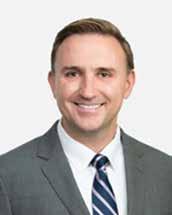
Jason LaFond is a board-certified appellate lawyer with significant experience in the
The following are summaries of selected civil opinions issued by the Fifth Circuit in June 2024. The summaries are overviews of particular aspects of the opinions; please review the entire opinions.
CONTRACTS:
Force majeure provision in natural gas supply contract did not require showing that performance is impossible.
MIECO, LLC v. Pioneer Nat. Res. USA, 2024 WL 3418718 (5th Cir. June 16, 2024).
The North American Energy Standards Board (NAESB) publishes a standardized but customizable base contract for fuel supply. Using the NAESB contract, parties may contract for “firm” delivery, meaning either party may interrupt its performance without liability only to the extent that such performance is prevented for reasons of force majeure. Pioneer produces natural gas from West Texas’s Permian Basin, and, after processing by a third party, sells the final product and transfers it to customers like MIECO. MIECO and Pioneer entered into a customized NAESB contract governed by New York law, providing for firm delivery of 20,000 MMBtu of natural gas daily from Pioneer to MIECO.
The parties customized the NAESB contract’s force majeure provision to excuse nonperformance when performance is “pre -
vented” by unforeseeable events outside the nonperforming party’s reasonable control—expressly including freezing weather. To be outside the nonperforming party’s reasonable control, the nonperforming party must be unable to overcome or avoid the event’s effects through due diligence and reasonable efforts.
During Winter Storm Uri, Pioneer did not deliver promised gas to MIECO over several days, costing MIECO $9 million. MIECO sued for breach, and Pioneer asserted force majeure as a defense, claiming Uri’s impact on “natural gas deliveries from natural gas processors in the Permian Basin” constituted force majeure.
The district court granted summary judgment to Pioneer on force majeure. The Fifth Circuit affirmed in part, reversed in part, and remanded.
The Fifth Circuit first rejected MIECO’s argument that a force majeure event “prevents” performance only if it renders performance literally impossible. Reviewing various dictionaries, the Court found that “prevents” includes impracticality—not just impossibility. And the Court explained that if “prevent” meant “make impossible,” the contract would not need to require the nonperforming party to be “unable to overcome or avoid” the event “by exercise of due diligence.”
The Fifth Circuit also rejected MIECO’s argument that a provision excluding “the loss or failure of Seller’s gas supply” from force majeure required Pioneer to purchase replacement gas on the spot market. The Court reasoned that the NAESB contract’s use of the possessive “Seller’s” suggests the “gas supply” is owned or possessed by Pioneer, something which cannot be said of the gas on the spot market.
The Court nonetheless reversed summary judgment because fact issues remained about whether Pioneer satisfied the agreed upon due diligence requirement. According to the Court, the district court failed to sufficiently engage with MIECO’s due diligence arguments, so a remand was appropriate.
TRADEMARKS: Wholesale exclusion of decades of
third-party-use evidence offered in support of genericness defense was prejudicial error.
Gibson, Inc. v. Armadillo Distribution Enterps., 107 F.4th 443 (5th Cir. 2024).
Gibson sued Armadillo under the Lanham Act and Texas common law on claims including trademark infringement and counterfeiting. Gibson alleged Armadillo infringed on four of its trademarked guitar body shapes, one trademarked guitar headstock shape, and two word marks. A jury found for Gibson and awarded a small amount of damages. After the verdict, the district court granted a permanent injunction against Armadillo prohibiting the sale of the infringing products.
The Fifth Circuit reversed and remanded with instructions to hold a new trial. The Court held that an evidentiary error by the district court infected the whole trial with prejudice.
Armadillo’s merits defense centered on genericness. Generic marks are categorically excluded from trademark protection. Armadillo intended to prove that the marks Gibson relied on were generic by showing that third parties had historically used the Gibson body shapes, headstock shape, and word marks without objection from Gibson.
At Gibson’s urging, the district court excluded under Federal Rule of Evidence 403 all third-party evidence from before 1992—five years before Armadillo entered the marketplace. The district court relied on a federal circuit decision—Converse—stat-
ing that third-party use older than five years should only be considered relevant if there is evidence that such uses were likely to have impacted consumers’ perceptions of the mark as of the relevant date. The district court concluded that the marginal relevance of the historic evidence was outweighed by concerns of judicial efficiency and risk of jury confusion.
The Fifth Circuit rejected the district court’s reliance on Converse, explaining that Converse considered a different question and, in any event, did not impose any five-year cut-off on the relevance of third-party use evidence. The Court also rejected Gibson’s alternative argument that a statute limiting when one may petition to cancel a mark supported the district court’s ruling. The Court said that a mark may always be challenged on grounds that it was generic before registration.
The Court further held that the district court’s Rule 403 analysis was mistaken. Such a sweeping use of Rule 403 conflicts with the principle that pretrial motions seeking the wholesale exclusion of a class of relevant evidence require careful review.
Finally, the Court found that the district court’s error was prejudicial because the jury was not presented with a complete picture of what happened prior to the alleged period of infringement and heard little to no evidence supporting Armadillo’s theory that the Gibson trademarks were generic. Because genericness was related to all issues on which the jury found against Armadillo, a new trial was required. AL

Specialists In Professional Liability For Lawyers And Title Agents


Laurie Ratliff is a former staff attorney for the Third Court of Appeals. She is board-certified in civil appellate law by the Texas Board of Legal Specialization and owner of Laurie Ratliff LLC.
The following are summaries of selected civil opinions issued by the Third Court of Appeals during June and July 2024. The summaries are overviews; please review the entire opinions. Subsequent histories are current as of Aug. 12, 2024.
>FAMILY
LAW: Court grants mandamus relief in contempt proceeding.
In re Kozinn, No. 03-23-00748-CV (Tex. App.—Austin June 6, 2024, orig. proceeding) (mem. op.).
In response to ex-wife’s petition to enforce the parties’ divorce decree raising numerous violations, the trial court held ex-husband in contempt, ordered him to pay $11,500 to ex-wife for each violation, and ordered him to pay
ex-wife’s attorney fees of over $47,000. The court of appeals observed that the contempt order was criminal in nature, thus due process requires full notice of the contemptuous acts. According to the Court, the order’s requirement to attend an age-appropriate parenting class was ambiguous. The Court further observed that monetary fines for contempt are not payable to a private litigant. The Court concluded that the attorney fees award was reviewable on direct appeal. The Court granted mandamus relief in part and denied in part. The dissent concluded that the order to take an age-appropriate parenting class was specific enough to enforce by contempt.
FAMILY LAW: Court grants mandamus relief where trial court failed to transfer to child’s county of residence.
In re Bensyl, No. 03-24-00291-CV (Tex. App.—Austin June 19, 2024, orig. proceeding) (mem. op.).
Real party in interest (RPI) filed a motion to enforce a child-support order in Bell County. Relator filed a motion to transfer, contending the child had resided in Potter County for more than six months. RPI did not respond to the transfer motion or file a controverting affidavit. The trial court did not grant the transfer and instead set the motion for hearing. According to the court of appeals, Family Code § 155.201 provides for the mandatory transfer of a SAPCR if a party timely moves to trans -

fer and the child has resided in another county for six months or longer. Relator timely filed her motion to transfer and RPI did not file a controverting affidavit. Thus, the Bell County trial court was required to transfer the proceeding without a hearing. The Court granted mandamus relief.
VEXATIOUS LITIGANT: Court reverses vexatious litigant finding where evidence failed to show no probability of success.
Johnson v. Bastrop Cent. Appraisal Dist., No. 03-23-00354-CV (Tex. App.—Austin June 21, 2024, no pet. h.) (mem. op.).
After several years of unsuccessful litigation with BCAD, the trial court declared Johnson a vexatious litigant and required him to post $38,000 as security. When Johnson failed to do so, the trial court dismissed the case. According to the court of appeals, BCAD had the burden to prove that Johnson had no reasonable probability of prevailing in his lawsuit. The underlying dispute involved Johnson’s application for open-space appraisal for agricultural use. Johnson used his land to raise and train horses for polocrosse. BCAD contended that this was a recreational use, citing a prior jury finding that Johnson was not entitled to an agricultural exemption. According to the Court, BCAD failed to show that raising and training horses was not an agricultural use. Thus, BCAD did not meet its burden to show Johnson was a vexatious litigant. The Court reversed and remanded.
PERSONAL INJURY: Court grants mandamus relief in a discovery dispute.
In re Kalahari Resorts, No. 0324-00271-CV (Tex. App.—Austin June 26, 2024, orig. proceeding) (mem. op.).
In this personal injury lawsuit against the resort and an employee, one law firm represented both defendants. Shortly before trial, defense counsel withdrew. The trial court ordered the deposition of the resort’s corporate representative on the issue of the conflict of interest that precipitated prior counsel’s motion to withdraw. The corporate representative testified that the conflict was not based on new facts but instead was based on an analysis of different legal theories and defense strategies available to each defendant. Plaintiff’s counsel filed a motion to compel, contending the representative failed to disclose the basis for the conflict of interest. The trial court granted the motion and ordered a second deposition. The court of appeals concluded that the resort’s communications with its insurers about how available defenses might present potential conflicts were confidential attorney-client communications. The Court granted mandamus relief.
WHISTLEBLOWER ACT: Court dismisses lawsuit where plaintiff failed to give notice of intent to appeal termination.
White v. Phillips, No. 03-2200375-CV (Tex. App.—Austin July 12, 2024, no pet. h.). White terminated Phillips on

May 28, 2021. On August 27, 2021, Phillips sued White under the Whistleblower Act, alleging retaliation for filing reports of unlawful conduct. The trial court denied White’s plea to the jurisdiction alleging limitations, finding the claims were timely filed. The court of appeals rejected Phillips’ claim that his termination occurred on May 30, the date he was removed from the payroll, and held that May 28 was the date his claim accrued. Thus, the 90-day period ended on August 26, a day before Phillips sued. The Court further rejected Phillips’ argument that he initiated the grievance procedure in Gov. Code § 554.006(c) that tolls limitations. An employee must at least give notice of intent to appeal an employer’s adverse employment determination. Phillips’ text to White complaining of the manner in which he was terminated failed to give notice that he was initiating a grievance. Thus, Phillips’ lawsuit was not timely filed. The Court reversed and dismissed.
ADMINISTRATIVE
LAW: Court finds no ultra vires claim relating to TDCJ’s handling of lethal-injection drugs.
Tex. Dep’t of Criminal Justice v. Canales, No. 03-23-00248-CV (Tex. App.—Austin July 12, 2024, no pet. h.).
Inmates sued TDCJ and three of its officials for the use of expired lethal-injection drugs in violation of the Pharmacy Act and Controlled Substances Act. The trial court denied defendants’ plea to the jurisdiction asserting immunity. Inmates’ ultra vires claim alleged that defendants acted without legal authority in obtaining and administering the lethal injection drugs. The court of appeals observed that Article 43.14 of the Criminal Procedure Code authorized the TDCJ director to determine the protocol for carrying out executions by lethal injection and that the statute granted broad authority to select, procure, and store the drugs used. The Court rejected inmates’ argument that the other Acts con-

trolled the narrow circumstances addressed by Article 43.14 for carrying out executions. According to the Court, Article 43.14 operated independently from the Acts cited by inmates. Thus, inmates failed to allege a valid ultra vires claim, and the Court reversed and rendered. The dissent concluded that the cited Acts all regulated some aspect of procuring, possessing, and administering drugs; found no basis for exempting the lethal-injection drugs from the Acts’ requirements; and would have affirmed.
ATTORNEY FEES: Court reverses attorney-fee award for insufficient evidence.
Schultz v. Schultz, No. 03-2200762-CV (Tex. App.—Austin July 31, 2024, no pet. h.) (mem. op.).
In a modification proceeding, ex-husband sought attorney fees and sanctions under Rule 215 and Family Code § 156.005. The trial court ordered ex-wife to pay $50,000 in attorney fees and sanctions under both sections. Ex-wife

challenged the sufficiency of the evidence to support the award. Citing Rohrmoos, the court of appeals observed that conclusory testimony lacking any real substance will not support a fee award. Ex-husband’s attorneys provided invoices that substantiated the number of hours worked and rates charged, but redacted all descriptions of the work performed. The Court concluded that the billing records and attorneys’ testimony failed to provide any details of the specific tasks performed, who performed the tasks, and the time necessary to perform the tasks. Accordingly, the evidence lacked the required substance to uphold a fee award. The Court reversed and remanded. AL








The following is a summary of a selected criminal opinion issued by the Third Court of Appeals in January 2024. The summary is an overview; please review the entire opinion. Subsequent history is current as of Aug. 6, 2024.
>T
RIAL TESTIMONY — LICENSING STATUS OF WITNESS, RELIABILITY OF WITNESS, RELIABILITY OF OUTCRY WITNESSS, AND “BACKDOOR HEARSAY”: Trial court did not abuse its discretion by admitting: (1) testimony from an unlicensed sexual assault nurse examiner (SANE), (2) testimony from an outcry witness, and (3) “backdoor hearsay” statements.
Koury v. State, 684 S.W.3d 537 (Tex. App.—Austin 2024, pet. ref’d).
A jury convicted Koury of the offense of aggravated sexual assault of a child. On appeal, he argued that the trial court abused its discretion by admitting testimony from three witnesses.
First, he argued that the testimony of the SANE nurse who examined the victim was inadmissible because she was unlicensed at the time of the examination.
Specifically, Koury contended that because the nurse “could not have legally done the exam, any information she obtained during the examination of [the victim] was obtained unlawfully and [was] therefore inadmissible as evidence” under Texas’ exclusionary rule. The Court rejected this argument for two reasons. First, the victim’s treatment by an unlicensed nurse did not impact the defendant’s rights. He therefore lacked standing to complain about any evidence seized as a result, and he similarly lacked standing to challenge the admission of the victim’s statements to the nurse on the basis that they were obtained by violating her rights.
Second, the licensing statutes are unrelated to the purposes of the exclusionary rule, which “principally serves to protect the rights of criminal suspects from the unlawful collection of evidence in anticipation of trial.” The purpose of the nursing statutes, in contrast, is to ensure the medical competence and training of nurses, and the purpose of a sexual-assault forensic examination “is medical treatment and diagnosis, not the procurement
of evidence.” Because the licensing statutes “are unconcerned with securing a criminal suspect’s rights against the gathering of evidence by law enforcement, violations of the statutes do not constitute violations of the law under” the exclusionary rule.
Next, Koury argued that the testimony of the outcry witness was unreliable. The outcry statute “creates a hearsay exception in the prosecution of certain sexual offenses committed against children for the admission of an alleged victim’s first outcry of sexual abuse to an adult.” For a statement to be admissible under that statute, “the trial court must find, in a hearing conducted outside the jury’s presence, that the statement is reliable based on its time, content, and circumstances.”
In examining whether the trial court abused its discretion in finding this witness reliable, the appellate court first rejected the eleven “indicia of reliability” that had been adopted by other courts. The Court explained that “because they seemingly require inquiries into the circumstances of the abuse allegations themselves, the biases or credibility of an outcry witness, or evidence admitted following the trial court’s ruling,” they “exceed the ‘exceptionally narrow’ focus of an [outcry-statement] hearing and the reach of our appellate review.”
The Court instead confined its analysis to the statutory considerations listed in the outcry statute, i.e., the time, content, and circumstances of the statement. After considering those factors, the Court concluded that “the evidence ad-
mitted at the [outcry-statement] hearing supports the trial court’s finding that [the victim’s] statements were reliable.” Koury’s “arguments were largely speculative and inquired impermissibly into [the witness’s] biases and credibility,” and they also required the Court “to consider evidence that was not before the trial court at the time of its ruling.” The Court also observed that an outcry statement need not be corroborated to be reliable, and any inconsistencies between a child’s outcry and later trial testimony “is a matter of credibility and goes to the weight of the evidence, not the reliability of the statement or its admissibility.”
Finally, Koury argued that the trial court abused its discretion by admitting “backdoor hearsay” statements during the testimony of the person who interviewed the victim. “Backdoor hearsay” is an attempt to circumvent the hearsay prohibition by eliciting indirectly the content or substance of an outof-court statement. Koury did not object to most of the “backdoor hearsay” that he complained about on appeal, but he preserved error as to the State’s asking the witness whether the witness “reveal[ed] specifics to [him] that [he] felt needed to be investigated,” whether she made an outcry, and whether she was able to describe movement. The Court concluded that the witness’s “affirmative responses to the objected-to questions did not impliedly convey the content of [the victim’s] interview statements” and thus were not backdoor hearsay. AL

The following are summaries of selected opinions issued by the Texas Supreme Court in June 2024. These summaries are prepared by court staff as a courtesy and are not a substitute for the actual opinions. The summaries are overviews of the opinions; please review the entire opinions.
ADMINISTRATIVE
LAW: Commission’s order approving electricity scarcity-pricing was not subject to judicial review.
Pub. Util. Comm’n of Tex. v. RWE Renewables Ams., LLC, No. 230555, ___ S.W.3d ___ (Tex. June 14, 2024).
The central issues in this case are: (1) whether the Public Utility Commission’s order approving a protocol adopted by the Electric Reliability Council of Texas regarding electricity scarcity-pricing constitutes a “competition rule[] adopted by the commission” under Section 39.001(e) of the Public Utility Regulatory Act (PURA), which may be directly reviewed by the court of appeals; and (2) if so, whether the Commission exceeded its authority under PURA or violated the Administrative Procedure Act (APA)’s mandatory rulemaking procedures in issuing the approval order.
In 2021, Winter Storm Uri strained Texas’s electrical power grid to an unprecedented degree. Electricity suppliers were unable to produce enough electricity to meet market-wide demand during the storm. Consequently, regulators struggled to maintain critical grid conditions and ultimately resorted to mandating lengthy and widespread blackouts to prevent catastrophic damage to the state’s power grid. Simultaneously, the Commission issued emergency orders administratively setting the wholesale price of electricity to the regulatory maximum in an effort to incentivize generators to rapidly resume production.
In the storm’s aftermath, ERCOT adopted, and the Commission approved, a formal protocol setting electricity prices at the regulatory ceiling under certain extreme emergency conditions.
RWE, a market participant, appealed the Commission’s approval order directly to the Third Court of Appeals.
The Court held the order was invalid, determining that (1) the order constituted a competition rule under PURA and a rule under the APA; (2) by setting prices, the rule was anti-competitive and so exceeded the Commission’s statutory authority under PURA; and (3) the Commission implemented the rule without complying with the APA’s rulemaking procedures.
The Supreme Court reversed, holding that the Commission’s approval order is not a “competition rule[] adopted by the commission” subject to the judicial-review process for such rules. The Court reasoned that PURA envisions a separate path for ERCOT-adopted protocols, which are subject to a lengthy and detailed process before being implemented. The statutory requirement that the Commission approve those adopted protocols before they may take effect does not transform Commission approval orders into Commission rules eligible for direct review by a court of appeals. Hence, the court of appeals lacked jurisdiction over the proceeding.
Accordingly, the Supreme Court vacated the court of appeals’ judgment and dismissed the case for lack of jurisdiction.
ADMINISTRATIVE LAW:
Statutory timeframe for annual HHSC external Medicaid contractor audits is mandatory.
Image API, LLC v. Young, No. 220308, ___ S.W.3d ___ (Tex. June 21, 2024).
At issue is the interpretation of a statute requiring the Health and Human Services Commission (HHSC) to conduct annual external audits of its Medicaid contractors and providing that an audit “must be completed” by the end of the next fiscal year.
HHSC hired Image API to manage a processing center for incoming mail related to Medicaid and other benefits programs. In 2016, HHSC notified Image that an independent firm would audit Image’s performance and billing

for years 2010 and 2011. Image cooperated fully. The audit, completed in 2017, found that HHSC had overpaid Image approximately $440,000.
Image sued HHSC’s executive commissioner for ultra vires conduct, alleging that she has no legal authority to audit Medicaid contractors outside the statutory timeframe. Image sought a declaration that the 2016 audit for years 2010 and 2011 violated Section 32.0705(d) of the Human Resources Code and an injunction preventing HHSC from conducting or relying on any noncompliant audit. The parties filed cross-motions for summary judgment, and HHSC also filed a plea to the jurisdiction.
The lower courts ruled for HHSC. Despite the statutory directive that an audit “must be completed” by a certain time, the court of appeals characterized the deadline as “mere[ly] a suggestion.” The court reasoned that the lack of any textual penalty for noncompliance, coupled with HHSC’s heavy workload, supported “forgo[ing] the common man’s interpretation of ‘must’” and construing the deadline as directory rather than mandatory.
The Supreme Court affirmed the part of the court of appeals’ judgment dismissing Image’s claims arising from the 2016 audit, while clarifying the man-
datory/directory distinction in Supreme Court caselaw. After agreeing with the court of appeals that Image is a Medicaid contractor, the Court emphasized that a statute requiring an act be performed within a certain time, using words like “shall” or “must,” is mandatory. Section 32.0705(d) is therefore mandatory because it states that a statutorily required audit “must be completed” within the time prescribed. What consequences follow a failure to comply is a separate question, which turns on whether a particular consequence is explicit in the text or logically necessary to give effect to the statute. Because there is no textual clue that the relief Image seeks is what the Legislature intended, the Court held that an injunction prohibiting HHSC from collecting overpayments found by the 2016 audit would be error.
The Court remanded the case to the trial court for further proceedings on remaining claims.
TAX PROTESTS: Tax Code limitations on appeal are procedural, not jurisdictional.
Tex. Disposal Sys. Landfill, Inc. v. Travis Cent. Appraisal Dist., No. 22-0620, ___ S.W.3d ___ (Tex. June 21, 2024).
The issue in this case is whether statutory limits on an appraisal district’s ability to challenge an appraisal review board’s decision confine the trial court’s subject-matter jurisdiction.
Texas Disposal Systems Landfill operates a landfill in Travis County. In 2019, Travis County Central Appraisal District appraised the market value of the Landfill, and the Landfill protested the amount under a Tax Code provision requiring equal and uniform taxation. The Landfill won its challenge, and the appraisal review board significantly reduced the appraised value of the landfill.
The Appraisal District appealed to the trial court and claimed that the appraisal review board’s appraised value was unequal and below market value. The Landfill filed a plea to the jurisdiction, arguing that it raised only an equaland-uniform challenge—not one based on market value. The trial court granted the Landfill’s plea.
The court of appeals reversed, holding that review of an appraisal review board’s decision is not confined to the grounds the taxpayer asserted before the board.
In an opinion by Justice Bland, the Supreme Court affirmed. The Tax Code limits the trial court’s review to the challenge the appraisal review board heard. That limitation, however, is procedural, not jurisdictional. The Court observed that the Tax Code allows parties to agree to proceed before the trial court despite a failure to exhaust administrative remedies, signaling that the parameters of an appeal are not jurisdictional because parties cannot confer jurisdiction by agreement. Additionally, the Tax Code employs limits like those in other statutes the Court has held to be procedural, not jurisdictional. The Court also noted that the fair market value of the property is relevant to an equal and uniform challenge, but if the fair market value deviates from the equal and uniform appraised value, a taxpayer is entitled to the lower of the two amounts.
Justice Boyd filed a dissenting opinion. He would have held that any limitation the Tax Code
imposes on the scope of the Appraisal District’s appeal is jurisdictional, and the statute does not limit the trial court’s jurisdiction to the specific protest grounds relied on by the taxpayer.
TEXAS MEDICAID FRAUD
PREVENTION ACT: No civil penalty when provider indicates license type but omits identification number on claim form.
Malouf v. State, No. 22-1046, ___ S.W.3d ___ (Tex. June 21, 2024).
The issue in this case is whether Section 36.002(8) of the Texas Medicaid Fraud Prevention Act (TMFPA) imposes civil penalties when a provider indicates their license type but fails to indicate their identification number on a claim form.
Malouf owned All Smiles Dental Center. Two of Malouf’s former employees filed qui tam actions against him, alleging that he and All Smiles committed violations of the TMFPA. The State intervened in both actions, consolidating them and asserting a claim under Section 36.002(8) of the Human Resources Code.
The State filed a motion for partial summary judgment, alleging that All Smiles submitted 1,842 claims under Malouf’s identification number even though a different dentist actually provided the billed-for services. Malouf filed a no-evidence summary judgment motion, arguing that a provider violates Section 36.002(8) only when he fails to indicate both the license type and the identification number of the provider who provided the service. Because the forms all correctly indicated the correct license type, Malouf argued he did not violate the TMFPA.
The trial court denied Malouf’s motion and granted the State’s, entering a final judgment that fined Malouf over $16,500,000 in civil penalties.
The court of appeals affirmed the trial court’s judgment apart from the amount awarded in attorney fees.
The Supreme Court reversed and rendered judgment in Malouf’s favor. In an opinion by Justice Boyd, the Court held that based on the statute’s gram-
matical structure, context, and purpose, Section 36.002(8) only makes unlawful the failure to indicate both the license type and the identification number of the provider who provided the service. The Court concluded that the State failed to demonstrate that Malouf committed unlawful acts under Section 36.002(8).
Justice Young filed a dissenting opinion. He would have held that Section 36.002(8) makes unlawful the failure to indicate either the type of license or the identification number.
TAX PROTESTS: Limits on scope of appellate review posed by Tax Code Section 1.111(e) agreements are nonjurisdictional.
Oncor Elec. Delivery Co. NTU, LLC v. Wilbarger Cnty. Appraisal Dist., No. 23-0138, and Mills Cent. Appraisal Dist. v. Oncor Elec. Delivery Co., No. 23-0145, ___ S.W.3d ___ (Tex. June 21, 2024).
The issue in these consolidated cases is whether questions regarding the validity and scope of a statutory agreement under Section 1.111(e) of the Tax Code implicate the trial court’s subject-matter jurisdiction over a suit for judicial review under Section 42.01 of the Code.
In 2019, Oncor’s predecessor-in-interest, Sharyland, protested the value of its transmission lines in various appraisal districts, including in Wilbarger and Mills counties. Sharyland ultimately settled its protests by executing agreements with the chief appraiser of each district. The agreements with the appraisal districts for Wilbarger and Mills counties each stated a total value for Sharyland’s transmission lines within that district.
After acquiring the transmission lines, Oncor sought to correct the two districts’ appraisal rolls, filing motions to correct under Section 25.25 of the Tax Code with the appraisal review board for each district. Oncor’s motions asserted that the valuations listed on each district’s appraisal rolls were based on a “clerical error” that occurred when Sharyland’s agent sent incorrect mileage data to the districts’ agent.
The Wilbarger appraisal review
board denied Oncor’s motions and the Mills appraisal review board dismissed the motions for lack of jurisdiction.
Oncor sought review of those decisions in district court in each county, suing both of the relevant appraisal districts and review boards, asserting the same claims, and seeking substantially identical relief in both cases. The relevant taxing authorities filed pleas to the jurisdiction, which were granted in the Mills case and denied in the Wilbarger case. The Wilbarger appraisal district and Oncor each filed an interlocutory appeal of the decision against them.
The courts of appeals reached conflicting decisions. In the Mills case, the court of appeals reversed in part and remanded for further proceedings, holding that the doctrine of mutual mistake, if applicable, would prevent the settlement agreement from becoming final. In the Wilbarger case, the court of appeals reversed the trial court’s order and rendered judgment granting the Wilbarger taxing authorities’ plea.
Oncor and the Mills taxing authorities petitioned the Supreme Court for review. The Supreme Court granted both petitions and consolidated the cases for oral argument.
The Supreme Court held that a Section 1.111(e) agreement poses nonjurisdictional limits on the scope of appellate review under Chapter 42 of the Tax Code.
Accordingly, the Court affirmed the court of appeals’ judgment in the Mills case, reversed the court of appeals’ judgment in the Wilbarger case, and remanded both causes to their respective trial courts for further proceedings.
APPELLATE PROCEDURE— VEXATIOUS LITIGANTS: Appeals and petitions for review from judgment or order in civil action are part of the same “litigation” under TCPRC Section 11.054(1)(A).
Serafine v. Crump, No. 23-0272, ___ S.W.3d ___ (Tex. June 21, 2024) (per curiam).
Pro se petitioner Serafine challenged the determination that she is a vexatious litigant.
The court of appeals affirmed the trial court’s order deeming Serafine a vexatious litigant by counting each of the following as separate “litigations”: (1) Serafine’s partially unsuccessful appeal to a Texas court of appeals of a final trial court judgment in a civil action; (2) her unsuccessful petition for review of that court of appeals judgment and motion for rehearing in the Texas Supreme Court; (3) her unsuccessful petition for writ of mandamus in the court of appeals; (4) a civil action she filed in federal district court that was dismissed for lack of jurisdiction; (5) her unsuccessful appeal of that dismissal to the Fifth Circuit; and (6) her unsuccessful petition for writ of mandamus in the Fifth Circuit.
Serafine challenged the court of appeals’ method of counting “litigations” under Section 11.054(1)(A) of the Texas Civil Practice and Remedies Code, which requires a showing that the plaintiff has in the past seven years “maintained at least five litigations as a pro se litigant other than in a small claims court that have been ... finally determined adversely to the plaintiff.”
The Supreme Court reversed and remanded the case to the trial court for further proceedings. It held that Serafine is not a vexatious litigant because an appeal and a petition for review from a judgment or order in a civil action are part of the same civil action and therefore count as a single “litigation.” Accordingly, Serafine maintained, at most, only four litigations as a pro se litigant that were determined adversely to her.
CONSTITUTIONAL LAW: Constitutional challenge to statute prohibiting certain medical treatments for children with gender dysphoria unsuccessful.
State v. Loe, No. 23-0697, ___ S.W.3d ___ (Tex. June 28, 2024).
The issue in this direct appeal is whether a law prohibiting certain medical treatments for children with gender dysphoria likely violates the Texas Constitution.
Parents of children who have been diagnosed with gender dys -
phoria, along with doctors who treat such children, sought to enjoin enforcement of a Texas statute that prohibits physicians from providing certain treatments for the purpose of transitioning a child’s biological sex or affirming a perception of the child’s sex that is inconsistent with their biological sex.
The trial court entered a temporary injunction enjoining enforcement of the law, concluding that it likely violates the Texas Constitution in three ways: (1) It infringes on the parents’ right to make medical decisions for their
children; (2) it infringes on the physicians’ right of occupational freedom; and (3) it discriminates against transgender children.
The Supreme Court reversed and vacated the injunction. In an opinion by Justice Huddle, the Court concluded that the plaintiffs failed to establish a probable right to relief on their claims that the law violates the Constitution.
The Court first concluded that, although fit parents have a fundamental interest in making decisions regarding the care, custody, and control of their children, that interest is not absolute and it does
not include a right to demand medical treatments that are not legally available. The Court observed that the Texas Legislature has express constitutional authority to regulate the practice of medicine, and the novel treatments at issue in this case are not deeply rooted in the state’s history or traditions such that parents have a constitutionally protected right to obtain those treatments for their children. The Court therefore concluded that the law is constitutional if it is rationally related to a legitimate state
TX Supreme continued on page 22.







purpose, and the plaintiffs failed to establish that it is not.
The Court next concluded that physicians do not have a constitutionally protected interest to perform medical procedures that the Legislature has rationally determined to be illegal, and the law does not impose an unreasonable burden on their ability to practice medicine. Finally, the Court held that the statute does not deny or abridge equality under the law because of plaintiffs’ membership in any protected class, so the plaintiffs failed to establish that the law unconstitutionally discriminates against them.
Justices Blacklock, Busby, and Young filed concurring opinions, although they also joined the Court’s opinion. Justice Blacklock observed that the issues in this case are primarily moral and political, not scientific, and he would conclude that the Legislature has authority to prohibit the treatments in this case as outside the realm of what is traditionally considered to be medical care. Justice Busby wrote to clarify that the scope of traditional parental rights remains broad and is limited only by the nation’s history and tradition, not by the nature of the state power being exercised. Justice Young noted that there is a considerable zone of parental authority or autonomy that is inviolate, but the parents’ claim in this case falls outside it.
Justice Lehrmann filed a dissenting opinion. She would have held that parents have a fundamental right to make medical decisions for their children by seeking and following medical advice, so a law preventing parents from obtaining potentially life-saving treatments for their children should be subjected to strict scrutiny, which this law does not survive.
TEXAS CITIZENS PARTICIPATION ACT: Court reverses TCPA sanctions against taxpayers in case alleging violations of Texas Constitution’s Gift Clauses.
Borgelt v. Austin Firefighters Ass’n, No. 22-1149, ___ S.W.3d ___ (Tex. June 28, 2024).
The issues in this case are: (1) whether a collective-bargaining agreement between the City of Austin and the Austin Firefighters Association violates the Texas Constitution’s Gift Clauses; and (2) whether the trial court erred by imposing Texas Citizens Participation Act (TCPA) sanctions and attorney fees on the plaintiffs.
In 2017, the City and the Association entered into a collective-bargaining agreement. Article 10 of the agreement, titled “Association Business Leave” (ABL), authorizes 5,600 hours of paid time off for firefighters to engage in “Association business activities,” which was defined to include activities like addressing cadet classes and adjusting grievances. Article 10 permits the Association’s president to use 2,080 of those hours, which is enough for him to work full-time while on ABL.
The Gift Clauses in the Texas Constitution prohibit “gifts” of public resources to private parties.
Taxpayers and the State sued the City, alleging that article 10 violates the Gift Clauses and seeking declaratory and injunctive relief. Specifically, the plaintiffs alleged that ABL time has been used for improper private purposes and that the City does not exercise meaningful control over the ABL scheme, but instead approves nearly all ABL requests without maintaining adequate records of how ABL time is used.
The trial court ruled on summary judgment that the text of Article 10 is not unconstitutional and awarded the Association attorney fees and sanctions under the TCPA.
The case proceeded to a bench trial on the issue of whether Article 10 is being implemented in an unconstitutional manner. The trial court concluded it is not and rendered judgment for the City.
The court of appeals affirmed.
In an opinion by Justice Young, the Supreme Court affirmed in part and reversed in part. The Court affirmed the court of appeals’ holding that Article 10 as written does not constitute an unlawful “gift” of funds. The agreement’s text and context impose limits on the use of ABL time, including that all such uses must support the fire
department. Allegations of misuse of ABL would constitute violations of the agreement rather than showing that the agreement itself is unconstitutional. The Court reversed the TCPA award of sanctions and attorney fees, holding that the taxpayers’ contentions were sufficiently weighty and supported by the evidence to avoid dismissal under the TCPA.
Justice Busby filed an opinion dissenting in part and concurring in the judgment in part. He would have held that Article 10 violates the Gift Clauses because the City does not exercise control over the Association to ensure that firefighters used ABL time only for public purposes. For that reason, he agreed that the TCPA awards must be reversed.
CIVIL
PROCEDURE: Court reverses dismissal of Texas Religious Freedom Restoration Act claims.
Hensley v. State Comm’n on Jud. Conduct, No. 22-1145,___ S.W.3d ___ (June 28, 2024).
This case raises jurisdictional issues arising from a suit under the Texas Religious Freedom Restoration Act (TRFRA).
Justice of the Peace Dianne Hensley declined to officiate marriages for same-sex couples due to her religious beliefs but referred those couples to another officiant. Although no one complained, the Commission found out and issued a public warning against Hensley for violating the Judicial Canon’s proscription on extra-judicial conduct that casts doubt on a judge’s capacity to act impartially as a judge.
Rather than appeal the warning to a Special Court of Review, Hensley sued the Commission and its members under the TRFRA, alleging that the warning substantially burdens her free exercise of religion.
The trial court granted the defendants’ plea to the jurisdiction, which was based on exhaustion of remedies and sovereign immunity.
The court of appeals affirmed.
In an opinion by Chief Justice Hecht, the Supreme Court reversed most of the court of appeals’ judgment.
The Court first held that Hens -
ley was not required to appeal the warning before bringing her TRFRA claim. Even if the Special Court were to reverse the warning, that disposition would not moot Hensley’s claims because it would not extinguish the burden on her rights while the warning was in effect. Hensley also seeks injunctive relief against future sanctions, and the Special Court is not authorized to grant that relief.
The Court turned to sovereign immunity and concluded that most of Hensley’s suit survives the defendants’ challenges. The TRFRA waives immunity from suit and liability. The defendants argued that the waiver does not apply because Hensley failed to meet a statutory presuit notice requirement. But the Court held that the written notice letter Hensley’s attorney sent the Commission is sufficient under the TRFRA. The Court clarified that the immunity from liability accorded the defendants under Government Code Chapter 33 does not affect a court’s jurisdiction, and it held that Hensley’s allegations are sufficient to state an ultra vires claim against the commissioners.
The Court affirmed the court of appeals’ judgment dismissing one request for a declaratory judgment against the Commission, reversed the remainder of the judgment, and remanded to the court of appeals.
Justices Blacklock and Young filed concurrences. Justice Blacklock opined that the Court should reach the merits of Hensley’s TRFRA claim and rule in her favor.
Justice Young expressed his view that the Court should only address legal questions in the first instance when doing so is truly urgent, and that test is not met here.
Justice Lehrmann dissented. She would have held that Hensley’s suit is barred by her failure to appeal the public warning to the Special Court of Review. AL


July & July District & County Court Jury Trial Verdicts
BY VELVA PRICE, TRAVIS COUNTY DISTRICT CLERK
Editor’s Note: A monthly update on jury trials in Travis County will also be circulated in Bar Code and posted on the Austin Bar app.
CIVIL
City Of Austin v. Laszlo Herczeg
Cause No.: C-1-Cv-20-003717
Judge: Eric Shepperd
Dates: June 3-4, 2024
Attorneys:
Plaintiff: Phillip B. Arnold, Bickerstaff, Heath, Delgado, Acosta LLP
Defendant: Laslo Herczeg, Pro Se Case Summary: Five jurors awarded the fair-market value of the property in a condemnation case. Total amount: $13,347.62.
The State of Texas v. Texas
SBA, Inc., Texas Certification Agency, Inc. D/B/A Texas SBA Business Certification, Inc., and Jamie Demericas
Judge: Catherine Mauzy, 419th Civil District Court
Cause No: D-1-Gn-22-004092
Dates: June 3-5, 2024
Attorneys:
Plaintiff: Monica Wadleigh, Texas Attorney General
Defendant: Roger Borgelt, Borgelt Law
Case Summary: The unanimous jury found that the defendants engaged in 6,208 false, misleading, and deceptive acts and awarded damages against defendants, Texas SBA, Inc. and Texas SBA Business Certification, Inc. for $3,104,000.00 each and Jamie Demericas in the amount of $18,624,000.
Steven Gambler v. Huber Javier Tinoco, All Pro Restoration Inc. D/B/A Servicemaster Restoration by All Pro, Servicemaster Clean/Restore Spe LLC, and Erick Mondragon Jaimes
Cause No: D-1-Gn-21-004734
Judge: Jessica Mangrum, 200th Civil District Court
Dates: June 4-10, 2024
Attorneys:
Plaintiff: Cole Gumm, Zinda Law Group, PLLC
Defendant: J. Hampton Skelton, Skelton & Woody, PLLC
Case Summary: Eleven jurors awarded damages incurred due to an automobile accident in a parking lot that occurred on or about July 31, 2021. Only damages were submitted to the jury. Damages awarded: Past physical pain - $83,360; future physical pain - $64,240; past mental anguish$64,240; future mental anguish - $32,120; past physical impairment - $83,360; future physical impairment - $64,240; future disfigurement - $0; past reasonable/ necessary medical care expenses - $90,000; and future reasonable/ necessary medical care expenses$110,000.
Glenn Lofgren v. Richard Green
Cause No.: C-1-Cv-20-005761
Judge: Todd Wong
Dates: June 24-28, 2024
Attorneys:
Plaintiff: Garrett Wilson, Lorenz & Lorenz, L.L.P.
Defendant: Shaunte Collins, Germer, Beaman & Brown, PLLC
Case Summary: The unanimous jury awarded the plaintiff damages as a result of a motor vehicle accident that occurred on Dec. 13, 2019: Past physical pain$10,000.00; past mental anguish - $3,000; past physical impairment - $4,100; past reasonable/necessary medical care - $8,953.
Majorie Drake v. Texas Health and Human Services Commission
Cause No: D-1-Gn-19-004253
Judge: Daniella Deseta Lyttle, 261st Civil District Court
Dates: June 25-July 2, 2024
Attorneys:
Plaintiff: Lenore R. Shefman, Shefman Law Group
Defendant: Jose L. Valtzar, Texas Attorney General
Case Summary: The unanimous jury found that on or about Feb. 18, 2018, the plaintiff was riding a bicycle that was hit by a vehicle driven by an employee of Texas Health and Human Services. Damages awarded are as follows: Past physical pain and mental anguish - $800,000; future physical pain and mental anguish - $600,000; past disfigurement - $450,000; future disfigurement - $400,000; past physical impairment - $400,000; future physical impairment - $700,000.
Saul Tirado v. Lauren Chambers
Cause No: D-1-Gn-19-002195
Judge: Karin Crump, 250th Civil District Court
Dates: June 25-26, 2024
Attorneys:
Plaintiff: David Round, Thomas J. Henry Law, PLLC
Defendant: Lisa Michaux, Leighton, Michaux & Brown, PLLC
Case Summary: The unanimous jury found that neither the defendant nor the plaintiff was responsible for the motor vehicle accident that occurred on or about Sept. 9, 2018.
Arely Montoya v. Michael Webley
Cause No: D-1-Gn-20-001950
Judge: Jessica Mangrum, 200th Civil District Court
Dates: June 25-27, 2024
Attorneys:
Plaintiff: Alberto de la TorreLaw Office of Joel A. Levine, PLLC
Defendant: Jose Silva-Martinez, Dieterich & Zarcone Legal Group
Case Summary: Ten jurors found that the defendant caused the motor vehicle accident that occurred on or about May 10, 2019. Damages awarded: Past physical impair-
ment - $1,000; past medical care expenses - $3,730.
Kensington Apartments
Austin, LP D/B/A Kensington Apartments v. Mark Cave and All Occupants
Cause No.: C-1-Cv-24-001228
Judge: Todd Wong
Dates: June 27, 2024
Attorneys:
Plaintiff: Allison Matlocks, Agent
Defendant: Mark Cave, Pro Se Case Summary: A unanimous jury found that the defendant, Mark Cave, failed to comply with the apartment lease contract. Damages awarded to plaintiff: Rent - $15,751.91; attorney fees (including appeals) - $26,365.
Mary Hammer v. Carl Joseph Fields
Cause No.: D-1-GN-22-004436
Judge: Karin Crump, 250th Civil District Court
Trial Date(s): July 8 –10, 2024
Attorneys:
Plaintiff: Kevin Johnson, KLJ Law PLLC
Defendants: W. Paul Miller/ Samantha Jeffers, Germer Beaman & Brown, PLLC Case Summary: This is a motor vehicle accident that occurred on or about Oct. 12, 2020. 10 jurors awarded damages – Past physical pain and suffering - $4k, Past medical and necessary medical expenses - $18k, Past/future physical impairment - $0.
Mike Johanns and Kathy Johanns v. Macapsil Realty Associates, Limited Partnership, D/B/A Storage Town USA Cause No.: D-1-GN-19-001088
Judge: Madeleine Connor, 353rd Civil District Court
Trial Date(s): July 9 –11, 2024
Attorneys:
Plaintiffs: John F. Melton, The Melton Law Firm, PLLC
Defendants: Stephen A. Mitchell
Case Summary: The Plaintiff claims that the Defendant wrongfully sold property housed in the self-service rental unit. 10 jurors found the Defendant engaged in false, misleading or deceptive acts and such acts were unconscionable but not knowingly. Damages awarded– Reasonable and necessary cost to replace property - $5k, Sentimental value of property - $5k, Value of property - $5k, Attorneys Fees for trial court - $19,488.00.
Frenrick Lamont Cathey et. al. v. Kalahari Resorts, Mario Martinez Buenrostro, Sr. et. al. Cause No.: D-1-GN-20-007621
Judge: Catherine Mauzy, 419th Civil District Court
Trial Date(s): July 9 –16, 2024
Attorneys:
Plaintiff: Travis E. Venable, Thomas J. Henry Injury Attorneys
Defendants: Efrain Cantu/ Zach Mayer, Mayer LLP, Trey Laidlaw/Brent Anderson, Taylor Anderson, LLP
Case Summary: This is a wrongful death case. The Plaintiffs petition states that they were pedestrians working in a construction zone replacing a damaged guardrail on Mopac and were struck by a drunken driver who was working for Kalahari Resorts as a bartender. [Case settled prior to verdict.]
Austin Arnold v. Omni Hotels Management Corporation
Cause No.: D-1-GN-19-006807
Judge: Daniella Deseta Lyttle, 261st Civil District Court
Trial Date(s): July 9–18, 2024
Attorneys:
Plaintiff: Robert Melendez, Melendez Law Firm, PLLC
Defendants: B. Kyle Briscoe, Peavler/Briscoe and Brian S. Rawson, Rawson Law PLLC
Case Summary: The Plaintiff claims that on or around Feb. 18, 2018, a golf cart he was driving locked up and threw him to the ground and the golf cart crushed him. 10 jurors found that the Defendant was 100% responsible and awarded damages – Future medical expenses - $2,367,000, Past physical pain and mental anguish - $125,000, Future physical pain and mental anguish - $650,000, Past physical impairment - $3,700
and future physical impairment$21,300.
Immo Daniel Urban and Victoria Van Buren
Cause No.: D-1-FM-23-01227
Judge: Amy Clark Meachum, 201st Civil District Court
Trial Date(s): July 22 –24, 2024
Attorneys:
Petitioner: Daniel Urban: Christopher Kirker
Respondent: Victoria Vanburen: Scott Dalrymple, Law office of Willie and Dasher
Case Summary: 10 jurors found that grounds exist for the annulment of a marriage. [Respondent
represented herself until July 26, 2024.]
Lee Roy Salinas and Viviana Frontino v. Tavera Yahir
Cause No.: D-1-GN-22-006008
Judge: Catherine Mauzy, 419th
Civil District Court
Trial Date(s): July 22–25, 2024
Attorneys:
Plaintiffs: Christine Londergan/Charles Dunn
Defendant: Natalie Nicole Garcia, Martinez, Dieterich & Zarcone Legal Group
Case Summary: This is a motor vehicle accident that occurred on or around May 26, 2022. 11 jurors
awarded damages – Lee Roy Salinas: Past medical care expenses$31,369.50 and $0.00 for all other damages; Viviana Frontino: Past medical care expenses - $17,624.81 and $0.00 for all other damages.
Krystle Hernandez v. 80th Group LLC D/B/A Concrete Cowbow et. al.
Cause No.: D-1-GN-17-003747
Judge: Jan Soifer, 345th Civil District Court
Trial Date(s): July 23–July 26, 2024
Attorneys:
Plaintiff: Daniel Sheppard, Morrow & Sheppard



Defendant: Ryan M. Owen, Thompson, Coe, Cousins & Irons, LLP
Case Summary: On or around June 24, 2017, Plaintiff claims that she was injured when she fell from the 2nd floor of a building due to the Defendant’s negligence.
The Defendant was found negligent, and 10 jurors awarded – Past physical pain - $75,000, Future physical pain - $520,000, Past mental anguish - $75,000, Future mental anguish - $75,000, Past disfigurement - $1,500, Future disfigurement - $3,000, Past Physical impairment - $65,000, Future physical impairment - $250,000, Past medical care expenses - $62,025.32, Future reasonable expenses of necessary medical care - $300,000.
CRIMINAL
State of Texas v. Jason Latzko
Cause No.: D-1-Dc-22-301215
Judge: Cliff Brown
Dates: June 3-5, 2024
Attorneys:
Defendant: Richard Seale Gentry
State of Texas: Shannon White Case Summary: The defendant was found not guilty of the charge of Assault - Family Violence - Strangulation. The defendant was found guilty of Aggravated Assault with a Deadly Weapon and a lesser-included offense of Assault. The defendant was sentenced to two years.
State of Texas v. Daniel J. McDonald
Cause No.: C-1-Cr-22-210086
Judge: Mary Espiritu
Dates: June 3– 4, 2024
Attorneys:
Defendant: Ryan Church, Dunham & Jones, P.C.
State of Texas: Jaime Flores Case Summary: The defendant was found not guilty of the charge of indecent exposure.
State of Texas v. Brian Scott
Cause No.: D-1-Dc-23-200543;
Judge: Bob Perkins
Dates: June 10, 2024
Attorneys:
Defendant: Leslie Boykin
State of Texas: Andrea Austin Case Summary: After the jury was chosen, the defendant pled guilty to
Assault Causing Bodily Injury and was sentenced to eight years of community supervision.
State of Texas v. Lindsay Smith
Cause No.: D-1-Dc-22-204226
Judge: Julie Kocurek, 390th Criminal District Court
Dates: June 10-13, 2024
Attorneys:
Defendant: Lisa Mims, Michael Price, James Twine
State of Texas: Danny Smith Case Summary: The defendant was found guilty of the charge of Intoxication Manslaughter, sentenced to 18 years, and fined $10,000.
State of Texas v. Blake Jones Cause No.: D-1-Dc-23-904083
Judge: Bob Perkins
Dates: June 24-28, 2024
Attorneys:
Defendant: Alexander L. Calhoun
State of Texas: Kyle Smith Case Summary: The defendant was found guilty of the charge of Injury to a Child Causing Serious Bodily Injury and that the defendant used a deadly weapon (hot water) during

the commission of the offense. The defendant was sentenced to 30 years and fined $6,000.
State of Texas v. Nora Lopez Cause No.: D-1-DC-21-302187
Judge: Melissa Goodwin
Trial Date(s): June 24-July 10, 2024
Attorneys:
State of Texas: Jean Sullivan/ Guillermo Gonzalez
Defendant: Laurie Drymalla/ Douglas O’Connell/Jessica Freud
Case Summary: This is the ‘bounce house’ case. The Defendant was convicted of murder and sentenced to 10 years. In addition, the jury found that the Defendant did not prove sudden passion by a preponderance of the evidence.
State of Texas v. Riese Panter Cause No.: D-1-DC-23-904032
Judge: Julie Kocurek, 390th Criminal District Court
Trial Date(s): July 8 – 11, 2024
Attorneys:
State of Texas: Andrea Richter
Defendant: Amber Vazquez
Case Summary: The jury found






the Defendant not guilty of the offense of sexual assault.
State of Texas v. Denis Ramirez-Barahona
Cause No.: D-1-DC-23-203069
Judge: Chantal Eldridge, 331st
Criminal District Court
Trial Date(s): July 15 – 17, 2024
Attorneys:
State of Texas: Jamie Liu
Defendant: Raymond Esperson
Case Summary: The jury found the Defendant not guilty of the offense of aggravated sexual assault, guilty of offense of sexual assault as a lesser included offense and guilty of prohibited sexual conduct. Defendant was sentenced to 20 years.
State of Texas v. Elliott Horn
Cause No.: D-1-DC-22-500165
Judge: Mike Denton
Trial Date(s): July 16 – 18, 2024
Attorneys:
State of Texas: Yasmeen Aboellhasan
Defendant: Lance N. Stott
Case Summary: The jury found the Defendant not guilty of the offense of sexual assault of a child.
State of Texas v. Denzel Hardman
Cause No.: D-1-DC-24-904039
Judge: Selena Alvarenga, 460th Criminal District Court
Trial Date(s): July 29 – August 1, 2024
Attorneys:
State of Texas: Habon Mohamed
Defendant: Justin Fischer, Dunham and Jones, P.C.
Case Summary: Jury found the Defendant guilty of the offense of Aggravated Assault in which the Defendant intentionally, knowingly and recklessly cause bodily injury to victim by shooting the victim and use and exhibit a firearm and not guilty of the offense of Aggravated Assault in which the Defendant intentionally and knowingly threatened the victim with imminent bodily injury and exhibit a firearm
during the commission of the said assault. The jury also assessed a five-year prison term but suspended the sentence and the Defendant was placed on community service because the Defendant had never been convicted of a felony.
State of Texas v. Kendric Knatte Cause No.: D-1-DC-20-600051
Judge: Brenda Kennedy
Trial Date(s): July 29 – Aug. 2, 2024
Attorneys:
State of Texas: Victor Erbring Defendant: Rick Cofer, Cofer & Connelly, PLLC Case Summary: Defendant was found guilty of the offense of tampering with evidence but a mistrial was granted on the charge of murder.
SUPPLEMENTAL MAY JURY TRIAL
Antonio Monroe v. JD Abrams, L.P., Jorge A. Santana, Sr., & Jorge A. Santana, Jr.
Judge: Jan Soifer, 345th Civil District Court
Trial Date(s): May 13 – 21, 2024
Attorneys:
Plaintiff: Jack Morrison, Thomas J. Henry Law, PLLC Defendants: Rodney Geer, Fee, Smith & Sharp, LLP
Case Summary: Plaintiff claims he was injured due to his vehicle being struck with electric or utility wiring from roadside construction. Jurors found that the Defendants Jorge Santana Sr. was 5% and JD Abrams, LP was 95% negligent. 10 jurors awarded damages as follows: Past physical pain and mental anguish$50,000, Future physical pain and mental anguish - $10,000, Past loss of earning capacity - $12,096, Past medical expenses - $36,047 and Future medical expenses - $5,000. AL
FORMER LAW OFFICE SPACE F OR LEASE








Thank You to the 2024 Austin Bar 100 Club Members!

The Austin Bar Association is proud to recognize our 2024 Austin Bar 100 Club members!
The following firms, government agencies, organizations/ schools, and corporate legal departments have 100 percent membership in the Austin Bar.
The Austin Bar 100 Club is a distinguished membership that reflects a commitment to the advancement of the legal profession and involvement in the community. The Austin Bar 100 Club consists of firms with four or more attorneys that have 100 percent participation in the Austin Bar.
Recognition is free and occurson the austinbar.org website, in Austin Lawyer, and at our Annual Meeting in the fall.
The Austin Bar 100 Club is FREE recognition and open for renewal annually. We do not automatically renew an organization’s membership due to changes in attorney rosters each year.
It’s not too late! To become a 2024 Austin Bar 100 Club member, submit your request via email to Billy Huntsman at billy@austinbar.org and include a list of all lawyers in your Austin-area office. Your list will be verified with our member records, and if your firm is eligible, it will be added to the 2024 Austin Bar 100 Club!
Thank you for your support of the Austin Bar Association!
2024 Austin Bar 100 Club Members:
• Alexander Dubose & Jefferson LLP
• Allen Overy Shearman Sterling US LLP
• Allensworth Law
• Almanza, Blackburn, Dickie & Mitchell, LLP
• Andrews Myers, PC
• Armbrust & Brown, PLLC
• Barnes Lipscomb Stewart & Ott PLLC
• Barnett & Garcia, PLLC
• Barron, Adler, Clough & Oddo
• Blazier, Christensen, Browder & Virr, PC
• Bollier Ciccone, LLP
• Boulette Golden & Marin LLP
• Bracewell LLP
• Brim & Brim
• Brink Bennett Pargaman Atkins & Sanchez
• Burnett Turner, PLLC
• Burns Anderson Jury & Brenner LLP
• Butler Snow LLP
• Cain & Skarnulis PLLC
• Cantilo & Bennett, LLP
• Chamberlain - McHaney
• City of Austin Law Department
• Coffin Renner LLP
• Coldwell Bowes LLP
• Cook Brooks Johnson PLLC
• Cornell Smith Mierl Brutocao Burton, LLP
• Dalrymple, Shellhorse, Ellis & Diamond, LLP
• DeShazo & Nesbitt LLP
• Doyle & Seelbach PLLC
• DuBois, Bryant & Campbell LLP
• Dykema Gossett PLLC
• Eichelbaum Wardell Hansen Powell & Munoz, PC
• Enoch Kever PLLC
• Evertson & Sanchez PC
• Friday Milner Lambert Turner, PLLC
• Fritz Byrne, PLLC
• Giordani Fitte Grossman & Ripp LLP
• Gjerset & Lorenz, LLP
• GoransonBain Ausley
• Graves, Dougherty, Hearon & Moody
• Gray & Becker, PC
• Greenberg Traurig, LLP
• Hanna & Plaut, LLP
• Hardie Alcozer PLLC
• Herring & Panzer, LLP
• Hopper Mikeska, PLLC
• Howry, Breen & Herman LLP
• Jackson Sjoberg LLP
• Kaplan Law Firm, PLLC
• Kelly Hart & Hallman LLP
• Kirker Davis
• Kuperman, Orr & Albers, PC
• Lloyd Gosselink
• Locke Lord
• Lucosky Brookman, LLP
• Maples Jones, PLLC
• Martens, Todd & Leonard
• Martin, Disiere, Jefferson & Wisdom, LLP
• McGinnis Lochridge LLP
• McGuireWoods LLP
• McKool Smith, PC
• McLean & Howard, LLP
• Metcalfe Wolff Stuart & Williams, LLP
• Minton, Bassett, Flores & Carsey, PC
• Mitchell, Williams, Selig, Gates & Woodyard PLLC
• Munsch Hardt Kopf & Harr, PC
• Naman Howell Smith & Lee, PLLC
• Noelke Maples St. Leger Bryant, LLP
• Nunis & Associates
• Osborne, Helman, Scott, Knisely & Stanton, LLP
• Pappas Grubbs Price, PC
• Pillsbury Winthrop Shaw Pittman LLP
• Potts Blacklock Senterfitt, PLLC
• Reed Claymon Meeker Krienke & Spurck PLLC
• Reeves & Brightwell, LLP
• Richards Rodriguez & Skeith, LLP
• Richie & Gueringer, PC
• Scott Douglass & McConnico
• Slack Davis Sanger LLP
• Streusand, Landon, Ozburn & Lemmon, LLP
• Texas Board of Law Examiners
• Texas Comptroller of Public Accounts
• Texas Department of Motor Vehicles
• Texas Workforce Commission
• The Carlton Law Firm PLLC
• The Chapman Firm PLLC
• The Supreme Court of Texas
• Third Court of Appeals
• Thompson Salinas & Londergan, LLP
• Travis County Attorney’s Office
• Travis County Civil Court
• Travis County Criminal Court
• Travis County District Attorney’s Office
• Travis County Office of Child Representation
• Travis County Probate Court
• Weisbart Springer Hayes, LLP
• Whitehurst Harkness Brees Cheng Alsaffar Higginbotham & Jacob, PLLC
• Winstead PC
• Wright & Greenhill, PC
Congratulations to Austin’s 50-Year Lawyers!

Linda Lee Aaker
Adrian G. Acevedo
William R. Allensworth
James M. Alsup
David B. Armbrust
Charles C. Bailey
Norma Gonzales Baker
John Thomas Barrett, Jr.
Roger A. Bartlett
Jack Elliott Beck
Mark E. Bentley
Patricia Finn Braddock
Jefferson K. Brim, III
Rhonda Hoehn Brink
W. Stephen Brittain
Barry J. Brooks
Barry Broughton
Myron D. Brown
Thomas L. Butler
John Walter Camp
Doug Caroom
Charles G. Childress
Edward Owen Coultas
James N. Cowden
Richard Flinn
Craig
William H. Daniel
Craig E. Davis
Jonathan R. Davis
Terrence J. Dunigan
Samuel Edward Dunn
John M. Erskine, Jr.
David O’Brien Frederick
Thomas D. Fritz
Mahon B. Garry, Jr.
Paul R. Gavia
M. Lucinda Glover
Margaret L. Gosselink
Charles O. Grigson
James O. Guleke, II
John Robert Hays, Jr.
Chief Justice Nathan L. Hecht
John Joseph Heisler
Emily E. Helm
Thomas H. Hight, Jr.
Richard C. Hile
Timothy Horan, Jr.
James Oscar Houchins
David G. Hume
Jane L. Jachimczyk
Sara S. Kennedy
Thomas A. Knapp
Kenneth Koch
Daniel M. Laney
H. Douglas Laycock
John G. Lione, Jr.
Stephen S. Livingston
Ronald Thomas Luke
Judge Michael F. Lynch
Phillip E. Marrus
Timothy K. Mashburn
Daniel N. Matheson, III
Jane Allard Matheson
Lee A. Matthews
Don B. Mauro
David B. McCall
Tom C. McCall
Gary Wayne McNeil
Wilson McVicker, Jr.
John R. Mercer
David M. Moore
Charles E. Munson, Jr.
John Richard Neel
Roger P. Nevola
Dale C. Orbeck
HOUSTON AUTO APPRAISERS
Office:1-877-845-2368
Cellphone: 832-279-2368 Email: Roy@HoustonAutoAppraisers.com
Karen Parker
Mark L. Perlmutter
James M. Phillips
Thomas R. Phillips
Lamar B. Piboin, Jr.
John D. Pieratt
Archie Carl Pierce
James Walter Piper
Bert W. Pluymen
Lee Riddell Polson
Jack L. Reynolds
Charles C. Sanders
William O. Schieffelin
David Ashley Sheppard
Susan D. Sheppard
John G. Soule
William E. Sterling, Jr.
John Robert Stratton
John S. Strickland
Raymond Lee Sturm
James A. Taylor
Gene Seth Terry
Dee Lee Thomas, Jr.
A. Richard Thormann, Jr.
Garry W. Vacek
Travis Evans Vanderpool
Raul Reza Vasquez
William M. Waxman
Allan Lewis Williams
Larry C. Wood
J. Pat Wyche

2024 Austin Bar Foundation Grants Total $27,500

The Austin Bar Foundation is proud to annouce this year’s grant recipients! A total of $27,500 in grants were awarded to seven community organizations that provide community service. These grants are made possible by your generous contributions at the Austin Bar Foundation’s annual Gala. The 2024 Gala raised more than $234,000.
Austin Community Radio Inc.
“Jury Duty Community Forum”
Amount awarded: $5,000
Jury trials are an essential part of the justice system. The belief that jury trials are fair and impartial is being tested in today’s environment. The forum will allow various parts of the community to discuss the importance of jury service.
Catholic Charities of Central Texas
“Expanding Immigrant Legal Aid with Department of Justice-Accredited Representatives”
Amount Awarded: $3,000
With large groups of migrants arriving at the U.S. southern border, the need for compassionate, affordable legal services has never been more important. The Immigration Legal Services program at Catholic Charities of Central Texas is receiving increased requests for services. Grant funding will support the training of our legal assistants to become Department of Justice-accredited representatives – legal professionals who can practice immigration law after
passing an extensive accreditation process. Through this initiative, we will expand legal services in Travis County by training and applying for at least two of our legal assistants to become DOJ-accredited representatives.
Lone Star Justice Alliance “Just Sentencing”
Amount Awarded: $5,000
Lone Star Justice Alliance (LSJA) believes that children and young adults should be held accountable for misconduct in developmentally appropriate ways that consider their age, social determinants of health, and emotional maturity. Additionally, the agency is committed to the principle that every young person deserves access to excellent and effective representation, regardless of their background or situation. To that end, LSJA provides direct strategic litigation on behalf of children and youth who were tried in the adult criminal legal system and given extremely long prison sentences, particularly those sentenced to life without parole. This includes working with survivors of abuse and human trafficking who are charged with the crimes of their abusers to achieve clemency or reduced sentences. LSJA also seals the juvenile records of eligible clients and trains young defense attorneys to better represent justice-involved youth.
LSJA staff litigators work on a small number of cases to ensure each unique case receives the proper amount of attention and time necessary to bring justice to clients. Funds from the Austin Bar Foundation will be used specifically to provide pro-bono legal services to clients impacted by abuse, trafficking, inadequate representation, and complex trauma.
Youth Justice Alliance
“Making Justice Accessible Conference”
Amount Awarded: $3,600
This is a proposed event at the Thompson Conference Center on
the UT campus. It mimics the Making Justice Accessible Conference put on by the Academy of Arts & Sciences in Cambridge, Massachusetts. The funding will cover space rental, lunch, and technology needs to serve about 120 people. The conference will be cohosted by The University of Texas chapter of the Youth Justice Alliance and the Minority Women Pursuing Law organization at UT.
CASA of Travis County
“CAPE Workshop for CASA Volunteers and Staff”
Amount Awarded: $5,000
CAPE stands for Cultivating Anti-Racism through Personal Exploration and is required of all staff and offered to volunteers. The CAPE Workshop is a 13.5hour curriculum designed to give participants an opportunity to examine racism, how it’s embedded in society, and to empower them to use the tools learned to cultivate anti-racism and anti-racist practices in the lives of the children they serve in the foster-care system. The Workshop will ensure that CASA volunteers and staff who make quarterly reports to the child-welfare courts do not propagate racist practices in the Travis County courts. The funds will be used to support the salaries of the workshop trainers for one cycle of the CAPE Workshop in 2024.
Seedling Foundation
“Mentoring Kids Who Have an Incarcerated Parent”
Amount Awarded: $5,000
This project will facilitate and expand the availability of services for children impacted by the legal system. Seedling provides schoolbased mentoring for children impacted by parental incarceration in the greater Austin area. Seedling was founded by Austin attorney John Blazier and began providing mentoring in the 200506 school year. The funds will be used to hire part-time staff to interview prospective mentors for the 2024-25 school year. Having
interviewers is important to mitigate the risk to students.
The Center for Child Protection “Facility Service Dog Program for Therapy and Court Accompaniment”
Amount Awarded: $5,000
The Center for Child Protection is expanding its successful Facility Dog Program with training and care of two additional dogs, empowering more children to testify against their abusers in court and seek healing through therapy – assisted by a furry companion that helps them feel safe. While child abuse affects all children, 82 percent of the families the Center for Child Protection served in 2023 were low-income, and they were disproportionately from minority communities. Of the 1,767 Travis County children the center served in 2023, 63 percent were Hispanic and 14 percent were Black. Children who have been abused experience significantly higher rates of numerous social and health problems.
The center’s highly trained facility dog, used by the entire Travis County Child Protection Team, is a key component to breaking the generational cycle of child abuse in our community.
The mission of the Austin Bar Foundation is to expand the provision of legal-related charitable and educational programs in Central Texas. The Foundation administers the Adoption Day Fund, the Denise Hyde Scholarship Fund, the Justice Mack Kidd Fund, the LGBTQ+ Scholarship Fund, and the Hon. Lora J. Livingston Fellowship Fund. You can donate to support any of these funds. You can also make general donations. Please also consider becoming a Fellow, Sustaining Fellow, or Lifetime Fellow.
Visit austinbar.org to learn more. All donations to the Austin Bar Foundation are tax-deductible. AL
In Memoriam: Pete Winstead
Founding shareholder of Winstead P.C. Pete Winstead died on Aug. 7, 2024, at the age of 84.
Winstead received his undergraduate degree from Stanford University and his J.D. from The University of Texas. As a young lawyer working for the Department of Justice Tax Division in Washington D.C., he was sent to Selma, Ala., to monitor the civil rights march, an event that shaped many of the principles he held so dear.
Winstead became a successful tax lawyer and expanded his expertise to provide invaluable guidance to startup companies, offering mentorship on financial backing, management procurement, and a variety of legal matters. He played a pivotal role when Winstead P.C. took Dell Computer Corporation public in 1988, and had a close personal

relationship with Michael and Susan Dell.
Winstead joined the Austin Bar in 1989 and was a staunch supporter of both the bar and the Austin Bar Foundation. Winstead P.C. has been a long-time member firm of the Austin Bar’s 100 Club.
Winstead held many leadership roles at Winstead P.C., as well as serving as chair of the Taxation Section of the State Bar of Texas. In 1997, Winstead was appointed by then-Governor George Bush to be the first chair of the Texas Turnpike Authority. He chaired the boards of the Austin Chamber of Commerce, the Real Estate Council, United Way, St. Edward’s University, the Greater Austin Crime Commission, and KLRU Public Television. He also served as chairman of the $50 million capital campaign for the Dell Seton Medical Center at The University of Texas. For his
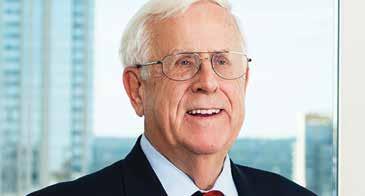
involvement in civic, political, and philanthropic matters in the Austin area, Winstead received numerous awards.
Winstead P.C. maintains offices in Austin, Dallas, Fort Worth, Houston, San Antonio, and The Woodlands, as well as Charlotte, N.C. and New York City.
Texas Lawyer recently released its Texas 100 List, which ranks Texas law firms based on headcount, gross revenue, revenue per lawyer, and profits per equity partner.
For 2023, Winstead P.C.:
• Had 281 lawyers in Texas; and
• Grossed $294.8 million, a seven-percent growth over 2022.
“Pete’s great joys were the love of family, firm, and his commitment to the City of Austin,” said Jeff Matthews, Winstead P.C. chairman and CEO. “He will be deeply missed by all whose lives he touched.” AL
Travis County Constable 5
The Courthouse Constable 1003 Guadalupe Austin, Tx 78701 Office: 512-854-9100 Fax: 512-854-4228 www.Constable5.com
EFILE: Request Constable 5 for Efile Process Service SERVICE FEES INCLUDE: Rush Services, Skip-Trace, Research, plus exclusive access to law enforcement database SERVICE AREA INCLUDES: Travis and surrounding counties 24/7 Online Service Check Daily delivery to State of Texas offices
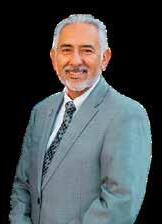

Judges Kocurek & Hecht Endorse Judicial Safety Bill
Austin Bar member Judge Julie Kocurek participated in a panel discussion at the University of North Texas–Dallas to endorse a bill by U.S. Senator John Cornyn to improve judicial safety.
Texas Supreme Court Chief Justice Nathan Hecht; Judge Kocurek’s son, Will; and Sen. Cornyn himself also participated in the panel discussion, along with other Texas judges, who discussed threats aimed at them.1
In 2015, Judge Kocurek and her son were the targets of an assassination attempt by a defendant Judge Kocurek had recently sentenced.
Sen. Cornyn’s bill, S.B. 3984, is called the Countering Threats and Attacks on Our Judges Act and passed the Senate 100-0 on June 12, 2024. It authorizes the State Justice Institute (SJI), established by an act of Congress in 1984, to provide monetary awards to certain organizations to establish a state judicial threat and intelligence resource center.2
The State Justice Institute currently provides awards to state and local courts “to improve the quality of justice … and foster innovative, efficient solutions to common issues faced by all courts.”3
Sen. Cornyn’s bill would allow the SJI to direct funds to “eligible organizations,” defined as a national nonprofit that:
• provides technical assistance, training, and has expertise and national experience in
judicial security and safety at the state and local levels;
• has experience in courthouse security design standards;
• has understanding of state judicial operations; and
• has experience working with trial, appellate, rural, and limited-jurisdiction courts at the state and local levels.
The resource center, housed in the SJI in Fairfax, Va., would:
• provide safety education and training for judicial officers, court staff, and local law enforcement;
• assess the security of courts, homes, and other facilities where judicial officers and staff conduct court-related business;
• collect and distribute warnings of threats to the safety of state and local judges and court staff;
• coordinate with federal, state, and local law enforcement to respond to such threats;
• develop standardized incident-reporting and threat-evaluation practices;
• develop a national database for reporting, tracking, and sharing information about threats and incidents related to the judiciary; and
• conduct research to advance best practices around judicial security.
The bill stipulates that, one year after the resource center is
512-487-7994
hello@herlihy-law.com scottherlihylaw.com
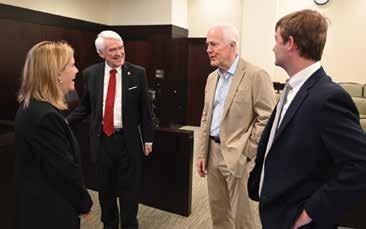
established, the SJI shall submit a report on the number, types, and severity of threats to state and local judiciaries that were reported. The report shall be submitted to both the Senate’s and House of Representatives’ committees on the judiciary.
This is not Judge Kocurek’s first foray into increasing protection for the judiciary in Texas. After the failed assassination attempt, she led a task force on judicial security in Texas. One third of the 2,579 judges surveyed (out of a little more than 3,300 total judges at the time) said security at their courthouses was poor.4
The task force eventually led to the Judge Julie Kocurek Judicial and Courthouse Security Act,5 which Gov. Abbott signed into law in 2017. The bill:
• established a court security division at the Office of Court Administration;
• required municipal judges and local administrative judges to establish court security committees;
• changed the requirements for court security personnel certification;
• changed statutes relating to judges’ and their spouses’ personal security and privacy; and
• authorized any commissioned police officer in the state to provide personal security
to judges.
Sen.Cornyn’s bill is co-sponsored by Democrats and Republicans from New Hampshire, Wyoming, Wisconsin, Maryland, and Arizona.
The bill has been endorsed by the Conference of Chief Justices, Conference of State Court Administrators, Council of Chief Judges of the State Courts of Appeal, All Rise, National Association for Presiding Judges and Court Executive Officers, National Association for Court Management, American Judges Association, National Center for State Courts, and the National District Attorneys Association. AL
ENDNOTES
1 https://www.untsystem.edu/ news/untd-col-hosts-cornyn-judicial-threat-legislation.php.
2 https://www.congress.gov/ bill/118th-congress/senate-bill/3984/text.
3 https://www.sji.gov/grants/project-grants/.
4 https://www.txcourts.gov/media/1436212/court-security-report-and-recommendations-final-w-cover.pdf.
5 https://www.txcourts.gov/media/1442095/sb-42-clean-version. pdf.
Immigration Law Firm Partners With LawPay to Boost Client Satisfaction
BY SAMMI JONES SPONSORED CONTENT
Sammi
Rose Immigration Law Firm
Rose Immigration Law Firm is a full-service immigration firm known for delivering high-quality assistance with a personalized touch. What’s their secret? Dedication, understanding, and LawPay.
The Benefits
We sat down with Doug Russo, owner and managing member of Rose Immigration Law Firm, and Andie Sanders, Director of Administration at Rose Immigration Law Firm, to learn how LawPay elevates the client experience and continues to revolutionize the way the firm does business.

Flexible Payments = Happier Clients
Client satisfaction is a top priority for the team at Rose Immigration.
“The client experience is one of the most important things that we do,” says Sanders.
To amplify experiences, the firm offers clients a variety of flexible payment options to meet individual needs.
“Because of the complexity of the immigration process, individuals are making a big investment to become permanent residents or U.S. citizens,” says Russo.
To ease anxieties and make the payment process easier, the firm uses LawPay’s Pay Later feature to enable their clients to make payments on their terms while ensuring reliable cash flow for their firm.
“It also allows us to get paid upfront so we can start work on the case immediately to speed up the process for the client,” says Russo.
Sanders says the firm also likes to offer payment plans through scheduled payments via LawPay. “The process is so easy for our clients. They give us a little bit of information, and we set up the timing of their payments,” she says.
Russo agrees that options are the best way to maximize client satisfaction.
“Whether it’s sending a link, a Quick Bill, or having the client go to our website, the clients have the ability to select several options,” he says.
Cash Flow to the Max
The immigration legal process is complex, and filing fees often must be paid upfront.
According to Sanders, “Using LawPay helps us recover that money faster and keeps our cash flow intact. Roughly 85% of our individual clients pay via LawPay in one form or another.”
Friendly Support You Can Rely On
Nothing beats old-fashioned customer service—even in the age of online payments and digital services.
Sanders recalls, “We had a client in Germany who had been trying to make a payment, and the international transfers were just really difficult.” To solve the problem so the firm could receive payment, Sanders reached out to LawPay customer support. “They were so friendly and got the problems figured out immediately,” she says.
Meet Clients at Every Point on Their Journey With LawPay
“Online payments are a necessity in 2024 and beyond,” says Sanders.
Sanders says she recommends LawPay to any other firm administrator she meets. “It just makes everything so simple. The reporting functionality is great for our reconciliations, the fees are affordable, and the client experience is great.”
Ready to see how LawPay can benefit your firm? Schedule a LawPay demo today.
TCWLA Scholarship Fund Announces 2024 Winners
BY VELVA PRICE, TRAVIS COUNTY DISTRICT CLERK
The winners of this year’s Travis County Women Lawyers’ Association (TCWLA) Scholarship Fund program were announced at a Hilgers House event.
In addition to the TCWLA Scholarship Fund’s annual Ann Forman and Mary Cooper scholarships, two new scholarships, named in honor of Judges Orlinda Naranjo and Lora Livingston, were also awarded.
The Lora Livingston Scholarship is awarded to a woman of African descent attending The University of Texas School of Law. The recipient should demonstrate a commitment to her community, a passion for access to justice, be involved in pro bono and public-service activities, and should exemplify servant leadership.
The inaugural Lora Livingston Scholarship was awarded to Tionna Ryan. Ryan just completed her second year at The University of Texas School of Law. She served as a research assistant for Tara Grove, Vinson & Elkins Chair in Law. Ryan was also the 1L representative for UT’s Student Bar Association. She was the vice president of the Thurgood Marshall Legal Society (TMLS), which is UT Law’s chapter of the National Black Law Students Association. In February, in honor of Black History Month, TMLS hosted the Afrofuturism Symposium, for which Ryan served as director. Before attending law school, Ryan was a an eighth-grade language arts teacher in Dallas.
The Orlinda Naranjo Scholarship is awarded to a Latinx woman attending The University of Texas School of Law. The recipient should show financial need, a history of involvement in the Latinx community, a demonstrated commitment to social and economic justice, and perseverance in the face of adversity, such as being a single parent.
The inaugural Orlinda Naranjo Scholarship was awarded to Jessica

(L-R): Iris Jones, Eva
and Rodnick co-founded the TCWLA Scholarship Fund, along with Judge
1987.
Martinez, who just completed her second year at UT Law. She took part in the Hispanic National Bar Association’s National Moot Court Competition. She has also served as the editor-in-chief of the Texas Hispanic Journal of Law and Policy. Martinez has been president of UT Law’s Chicano/Hispanic/ Latino Law Student Association (CHLLSA) and is a member of the Robert W. Calvert Inn of Court, UT Law’s Women’s Law Caucus, and the Hispanic National Bar Association.
The Margaret Cooper Scholarship is awarded to a UT Law student who best demonstrates perseverance, financial need, and a commitment to community service.
This year’s Margaret Cooper Scholarship was awarded to Franchizca Scipio, who just graduated from The University of Texas School of Law. She clerked at the Travis County Probate Court, interned with UT Law’s Domestic Violence and Children’s Rights clinics, and served on the Texas Law Fellowship Board of Directors. She also participated in Explore Law, a summer program in which undergraduate students at UT Austin, Huston-Tillotson, and Austin Community College hear
from faculty and staff at UT Law and the Longhorn Center for Academic Equity on the various fields of law and how the law school admissions process works. Scipio was active with TMLS, UT Law’s OUTLaw organization, which raises awareness of issues affecting the LGBTQ+ community, and she has volunteered at Pilgrim Rest Baptist Church.
The Ann Forman Scholarship is awarded to a student who demonstrates interest in child welfare law and community service.
This year’s Ann Forman Scholarship was awarded to Katherine Lewis. Lewis is a graduate of The University of Texas School of Law, where she was involved in the Women’s Law Caucus, the Human Rights Law Society, and the Public Interest Law Association. She has served as a student attorney with the Children’s Rights Clinic, as a law clerk with Texas RioGrande Legal Aide in the Family Defense Project, and as a judicial intern with the Hon. Aurora Martinez Jones at the 126th District Court, which specializes in Child Protective Services cases.
In the fall of 2024, the TCWLA Scholarship Fund will hold a fundraiser for its newest scholarship, named after Ana Meija-Dietche.
Meija-Dietche was a past president of TCWLA and board member of the Scholarship Fund who died on Feb. 24, 2024, of ovarian cancer. During her short life, she worked for Legal Aid DC, a Washington, D.C.,-based organization providing free legal services in housing, domestic violence/family, public benefits, and consumer law, as well as appellate advocacy, immigration services, and reentry services for individuals released from prison. She also worked in the Office of the General Counsel–Public Health Division of the National Institutes of Health.
After coming to Austin, Meija-Dietche worked for the State Bar of Texas as a program attorney, where she was integral in planning CLEs; as the director of the Healthcare Workforce Alliance of Central Texas, which raises awareness of the healthcare workforce needs of Central Texas; and as a professor and grant writer at Austin Community College.
The Scholarship Fund is a 501(c)(3) charitable organization, separate from TCWLA, a 501(c)(6) professional association. All contributions to the Scholarship Fund are fully tax deductible. To learn more and to make a donation, visit tcwla.org. AL
Austin Bar Member Jason Snell Prevails Before Texas Supreme Court
Jason Snell and the Snell Law Firm obtained a final judgment from the Texas Supreme Court in favor of their client, who was awarded more than $16 million under the Texas Medicaid Fraud Prevention Act.
Justice Boyd delivered the opinion of the Court, joined by Justices Hecht, Devine, Busby, Bland, and Huddle. Justice Young filed a dissenting opinion, which Justice Lehrmann joined. Justice Blacklock did not participate in the decision.
Dr. Richard Malouf, a dentist in the Dallas-Fort Worth area, co-founded All Smiles Dental Center in 2002. In 2004, he started providing orthodontic services to Medicaid patients. In 2007, Malouf bought out his partner and retained full control of the business until he sold most of his interest in 2010.
In the six years that All Smiles provided services to Medicaid patients under Malouf’s ownership, office staff at each location used dentists’ charts to prepare bills to be submitted to the Medicaid office. These bills were first transferred to the company’s corporate office, which then sent the bills to Medicaid either electronically or on paper using a Medicaid-authorized form.
A completed form must state the provider’s name and Texas
Provider Identifier (TPI) number, which is a unique number assigned to each provider. The form does not require the provider’s license type, number, or any other identification number. This is redundant information, as to obtain a TPI, a provider must submit proof of their professional license.
In 2012, two former employees of All Smiles Dental filed qui tam actions alleging that Malouf and All Smiles committed numerous violations of the Texas Medicaid Fraud Prevention Act (renamed by the legislature in 2023 to the Texas Health Care Program Fraud Prevention Act1). The Texas Attorney General intervened and consolidated the actions.
Under Section 36.002(8) of the Texas Human Resources Code, the State then claimed Malouf committed an unlawful act by filing claims to the Medicaid program that knowing failed “to indicate the type of license and identification number of the provider who provided the service.”
The State alleged that Malouf directed his company to submit 1,842 claims that listed Malouf’s TPI number, even though dentists other than Malouf actually provided the services that were billed.
Based on this allegation, the State sought to recover the amount


Medicaid paid for those services, plus prejudgment interest, statutory penalties, attorney fees, and expenses. The State filed a motion for partial summary judgment on only that claim.
Malouf primarily argued that none of the 1,842 claims were unlawful because they all correctly indicated the license type of the provider who provided the billed services. According to Malouf, a claim is lawful under Section 36.002(8) as long as it provides either the proper license type or an identification number.
The State argued that the section states that claim forms are unlawful unless they state both
the proper license type and identification number.
Malouf filed a no-evidencesummary-judgment motion, but the trial court denied it, instead granting the State’s motion for partial summary judgment.
The State then nonsuited its remaining claims and moved for entry of final judgment. The trial court awarded the State more than $16.5 million—approximately $538,000 for the amount Medicaid paid on the 1,842 claims; approximately $1.1 million as a civil penalty; a $5,000 penalty per unlawful act (1,842, for a total of about $9.2 million); and approximately $5.7 million for attorney
fees and expenses incurred.
The trial court denied Malouf’s motion for new trial, and Malouf appealed.
The Eighth Court of Appeals affirmed the trial court’s judgment, aside from disagreeing with the amount of attorney fees and expenses.2
The Texas Supreme Court’s opinion primarily relied on guidance from the U.S. Supreme Court’s recent decision in Pulsifer v. United States 3 The defendant in that case, Mark Pulsifer, pleaded guilty to distributing methamphetamine and faced a mandatory minimum sentence of 15 years in prison.
Pulsifer contended he met the requirements for safety valve relief, which states that federal courts must use the Federal Sentencing Guidelines if a defendant does not have:
A) more than four criminal history points, excluding any criminal history points resulting from a 1-point offense, as determined under the sentencing
guidelines;
B) a prior three-point offense, as determined under the sentencing guidelines; and
C) a prior two-point violent offense, as determined under the sentencing guidelines.
Pulsifer’s prior criminal history triggered subsections A) and B), but not C). Therefore, Pulsifer argued, he was eligible for safety valve relief because his prior criminal history did not trigger all three subsections. The State argued that the section should be interpreted as providing that a defendant is not eligible for safety valve relief if his prior criminal history triggers any of the three subsections.
Pulsifer urged the U.S. Supreme Court to apply the rule of lenity and construe the section in his favor.
“The Court declined, however, because it did not view the statute as ‘genuinely ambiguous,’” as the Texas Supreme Court’s opinion notes.
As with Malouf’s case, the U.S.

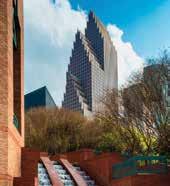
Supreme Court found in Pulsifer “two grammatically permissible readings of the statute when viewed in the abstract.” However, when read in the statutory context, Pulsifer’s proposed reading was eliminated.
In Malouf’s case, “The provision’s language, grammatical structure, statutory context, and general purpose leave Malouf’s construction of ‘and’ in the distributive sense the only permissible reading.”
The Texas Supreme Court reversed the Eighth Court of Appeals’ judgment and rendered in Malouf’s favor.
In a press release,4 Snell Law stated it was not hired until six months before the case was set for trial “and had to immediately engage in summary judgment proceedings.”
The firm also never got the chance to defend its client at trial because of the summary judgment issued by the trial court.
“While greatly outmatched in manpower and resources, the team at Snell Law persevered and fought against the Texas Attorney
General’s Office through adverse rulings in the trial court and lower appellate court to finally prevail on behalf of its client.” AL
ENDNOTES
1 See Act of May 29, 2023, 88th Leg., R. S., ch. 273, §§ 2–11, 2023 Tex. Sess. Law Serv. 585, 587 (codified at TEX. HUM. RES. CODE §§ 36.001–.132).
2 656 S.W.3d 402, 418 (Tex. App.—El Paso 2022).
3 144 S. Ct. 718 (2024).
4 https://www.snellfirm.com/snell-lawtriumphs-at-supreme-court-of-texas/.


Deadline for Public Comments on New Bar Exam: Sept. 30, 2024
The Texas Supreme Court issued an order1 on June 25, 2024, seeking public comment on the adoption of a new examination for individuals seeking admission to the Texas Bar.
The Texas Board of Law Examiners (BLE) has recommended the adoption of the NextGen Bar Examination, which would replace Texas’ current bar exam, the Universal Bar Exam (UBE). Like the UBE, the NextGen is a product of the National Conference of Bar Examiners (NCBE).
The BLE made the recommendation to the Texas Supreme Court after its NextGen Work Group studied the results of pilot test performance data published by NCBE. The pilot test ran from August 2022 to April 2023 and involved 2,500 law students and recently licensed lawyers.2
NCBE plans to launch the NextGen Bar Exam in July 2026. If adopted by Texas, which the Supreme Court anticipates, it will not be implemented here until July 2028.
Starting with the July 2026 exam, conflict of laws and secured transactions will be eliminated from the test, and family law and trusts and estates will be tested on the Multistate Performance Test (MPT) instead. However, after the February 2028 bar exam, the
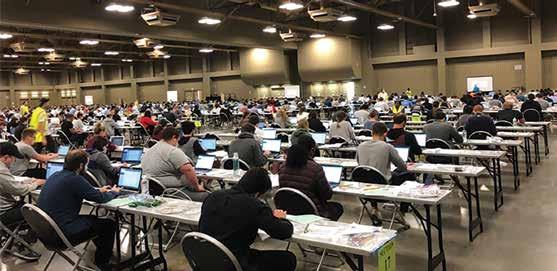
NCBE plans to completely eliminate the Multistate Essay Exam, the MPT, and the Multistate Bar Exam (MBE) components of the test. Instead, the NextGen will feature multiple-choice questions, integrated question sets based on a common fact scenario, and performance tasks “that a beginning lawyer should be able to accomplish.”3
Trust and estates will not be part of the NextGen, which will test on civil procedure, contract law, evidence, torts, business associations, constitutional law, criminal law, and real property. Family law will be reintegrated into the NextGen in July 2028.
In addition to these subjects,
the NextGen prioritizes the lawyering skills of legal research, writing, issue spotting and analysis, investigation and evaluation, client counseling and advising, negotiation and dispute resolution, and client relationships and management.
The NextGen will be taken on computers at proctored testing locations and is expected to be only nine hours long compared to the UBE’s 12.
As also recommended by the BLE, “an appropriate, graded Texas Law Component” should also be reintroduced, the Texas Supreme Court’s order reads, to ensure that individuals who want to become licensed in Texas have an under-
standing of Texas law.
“The content, timing, and format of this Texas Law Component have not yet been determined,” but it is expected to appear along with the inaugural NextGen Bar Examination in Texas if the new exam is adopted.
Public comment on this matter is being accepted through Sept. 30, 2024. Comments can be emailed to rulescomment@txcourts.gov. AL
ENDNOTES
1 https://www.txcourts.gov/media/1458783/249040.pdf.
2 https://nextgenbarexam.ncbex.org/ reports/research-brief-pilot-testing/. 3 https://nextgenbarexam.ncbex.org/ nextgen-sample-questions/.
SECOND FLOOR OFFICE CONDO F OR SALE
HIGHLIGHTS:
• Exceptional access from North/South traffic on MoPac (Loop 1) as well as from the primary East/West artery; Northland/FM-2222.
• The building has two access points off Balcones allowing easy parking lot flow.
• The subject unit is 4,748 SF located on the 2nd level of the building with views of downtown and the surrounding area.
• The unit is built out with traditional office finishes, 11 private offices, a breakroom/ kitchen, 2 open work spaces and a conference room.
• Excellent Owner-Occupant Opportunity
• Outstanding location, surrounded by Restaurants & Retailers

Chief Justice Hecht to Senate Judiciary Committee: Make Legal Aid Funding a Priority for Society
In testimony before the U.S. Senate Committee on the Judiciary on July 9, 2024, Texas Supreme Court Chief Justice Nathan Hecht laid out his ideas to make the civil justice system accessible for all Americans.1
Current methods for increasing access to justice fall into two categories: pro bono publico and legal aid services. But even with Texas’ 114,000 lawyers providing more than 2.7 million hours of free legal services, plus another one million hours in reduced-fees hours, pro bono work only meets a fraction of the state’s legal aid needs.2
Legal aid, defined by Chief Justice Hecht as “the employment of lawyers to provide legal services to the poor,” was not widespread until Congress created the federally funded Legal Services Corporation (LSC) in 1974. That funding is then distributed by LSC to legal-aid societies throughout the country. In Texas, there are three LSC partners: Texas RioGrande Legal Aid, Lone Star Legal Aid, and Northwest Texas Legal Aid. To qualify for legal-aid services from LSC partners, a client’s annual income must not exceed 125 percent of the federal poverty guidelines, which in 2024 is $18,225 for an individual and $37,500 for a family of four.3
But again, Chief Justice Hecht said, LSC meets only a fraction of the need.
Chief Justice Hecht has a sixpoint plan for how the legal community, as well as the non-legal community, can help improve access to justice.
1. Increased Use of Technology Technology increases efficiency. Trainings can be done remotely, as can participation in court proceedings, thereby saving lawyers and clients both time and money. Documents can be stored and processed more easily and dependably using digital systems.
2. Use of AI to Complement Work
While artificial intelligence cannot dependably supply accurate briefings or give clients advice, it can help with time-consuming and repetitive processes like summarizations of documents, depositions, and interviews.
3. Fewer Pro Se Litigants
Most states’ civil courts have replicated the Federal Rules of Civil Procedure, “which are designed to provide fairness and order in the most complex cases but not economy and simplicity,” Chief Justice Hecht writes. Litigants unable to afford the cost of a typical lawyer and unable to qualify or find legal-aid providers often choose to be pro se in cases dealing with eviction, debt collection, employment, and contracts. But pro se litigants often find it difficult to navigate the rules of procedure. The solution to this problem is to reduce the number of pro se litigants by expanding the number of legal-aid providers through funding and training to allow paraprofessionals to practice in certain areas of law without a law license.
4.
More Legal Service Providers
Legal services to the poor must be guided by lawyers, but much of the work in this area can be done by trained paraprofessionals without a law license. In 2023, the Texas Supreme Court approved a certification program for paraprofessionals to allow them to perform specific tasks previously limited to lawyers. Enlisting more paraprofessionals to undergo this training can increase the number of legal-aid providers while reducing client costs.
5. Limited Licensure Program
Current law school curricula and bar exams are not well-suited to lawyers who want a more limited practice, such as legal aid, Chief Justice Hecht writes. Additionally, the costs associated with law educa-
tion “pressure those who cross the finish line to seek more remunerative rewards.” To address this, the Conference of Chief Justices has formed the Committee for Legal Education and Admission Reform (CLEAR).4 This committee is currently researching the idea of creating a specialized course of study and limited licensure at much less expense and aimed at a particular type of practice, such as a legal-aid practice.
6.
Prioritize Legal Aid Funding
“A House Appropriations Committee chair once told me that legal aid is underfunded because it’s only a priority for lawyers,” Chief Justice Hecht wrote. LSC’s Leaders Council helps make legal aid funding a priority for society by involving businesspeople, professionals, sports figures, and others
outside the legal world in understanding the need and making the case. The American Academy of Arts and Sciences recently devoted its first open issue of its Daedalus publication to informing its non-legal readership of the challenges facing access to justice.5 AL
ENDNOTES
1 https://www.judiciary.senate.gov/ imo/media/doc/2024-07-09_-_testimony_-_hecht.pdf.
2 2021 Pro Bono Report, State Bar of Texas Dept. of Research & Analysis (https://shorturl.at/Cfkf7).
3 https://www.ecfr.gov/current/ title-45/subtitle-B/chapter-XVI/part1611.
4 https://www.ncsc.org/newsroom/ at-the-center/2023/clear-to-studyreforms-to-legal-education-and-admissions.
5 Daedalus, “Access to Justice” (Winter 2019) (https://www.amacad.org/ daedalus/access-to-justice).
Protection You Can Trust, Security You Can Rely On

Our specialized security firm is here to support you and your clients with services tailored to meet the unique needs of the legal profession.
• Threat Assessment & Risk Mitigation
• Executive Protection
• Estate Security
• Corporate Risk Management and Protection
• Reconnaissance & Surveillance
• Discreet Investigations
• Workplace Violence Prevention
Serving the Great State of Texas
www SpecialMissionConcepts.com License #C28520601 (737) 303-1618

Disabled Veteran-Owned and Operated
Ohio Casualty v. Patterson
BY MARY ELLEN KING AND SAMANTHA MCCOY, LUCOSKY BROOKMAN, LLP
The Texas Supreme Court recently granted review of an insurance dispute that could have far reaching, broadening impacts on the current state of the law in Texas as it relates to the duty to defend. The ruling from the trial court and the Court of Appeals blurred the distinction between defense and indemnity, as well as the distinction between expenses owed to or on behalf of the insured and those that are damages owed by the insured. Ultimately, the lower courts arguably failed to follow the established rules of contract construction and expanded the current scope of the insurers duty to defend liability insurance underlying litigation.
In 2020, Patterson-UTI Energy, Inc. and its affiliates (collectively, “Patterson”) sued Ohio Casualty and Marsh USA to recover its legal defense costs under its fifth-level excess policy.
Patterson obtained multiple layers of general liability insurance that covered defense costs through Marsh, as well as an excess policy from Ohio Casualty that Patterson argues follows the primary policy’s terms unless explicitly stated otherwise. Since the primary policy’s terms covered defense costs, Patterson argues that the excess policy provides the same coverage. Ohio Casualty, however, refused to cover defense costs, stating the excess policy does not provide such coverage and should be read separate from the primary policy.
All parties moved for summary judgment based on the threshold issue of whether the excess policy does, in fact, cover Patterson’s defense costs.
The trial court granted Patterson’s motion for summary judgment, siding with Patterson and Marsh. Ohio Casualty appealed the denial of its motion for summary judgment to the Fourteenth Court of Appeals.
Ohio Casualty argued on ap-
peal that Patterson incorrectly attempts to shift the burden to Ohio Casualty, when it is Patterson’s burden to show its entitlement to defense costs. Specifically, Ohio Casualty states that the excess policy has its own definitions and exclusions and, thus, is separate from the primary policy.
In The Ohio Casualty Insurance Company v. Patterson-UTI Energy, Inc., the Fourteenth Court of Appeals agreed with the trial court and Patterson, concluding that defense costs were covered under its excess insurance policy. 656 S.W.3d 729 (Tex. App.—Houston [14th Dist.] 2022, pet. filed). The appellate court stated that the excess policy must explicitly state any deviations from the primary policy and, since the policy did not clearly exclude defense costs, Ohio Casualty was required to provide coverage for defense costs.
Ohio Casualty filed a petition for review to the Texas Supreme Court, reasserting its arguments on appeal and contending that the excess policy only covers certain types of loss, excluding defense costs. Specifically, Ohio Casualty argues that Texas courts cannot presume that a follow-form policy follows the underlying policy’s coverage in all respects. The insured has the burden to establish coverage and, to determine whether a follow-form policy diverges and the metric for any divergence in coverage, courts must examine the follow-form policy’s language.
In the case at hand, the excess policy’s follow-form provision states: “Except for the terms, conditions, definitions and exclusions of this policy, the coverage provided by this policy will follow the ‘first underlying insurance.’” Ohio Casualty argues that the excess policy does not follow the underlying policy’s coverage of defense costs, as the excess policy’s follow-form provision provides for different coverage than the underlying policy. Thus, by presuming
Ultimately, the lower courts arguably failed to follow the established rules of contract construction and expanded the current scope of the insurers duty to defend liability insurance underlying litigation.
identical coverage, the court of appeals improperly shifted the coverage burden from Patterson to Ohio Casualty and, unlike the underlying policy, the excess policy does not add defense costs to the “damages” it covers as “loss.” Ohio Casualty concludes that, as a matter of law, Patterson cannot establish that the excess policy covers defense costs.
In its response, Patterson argues that, when the excess policy and primary policy are read together, as the follow-form provision requires, the excess policy covers Patterson’s defense costs incurred. Further, well-settled principles of Texas law instruct the courts to accept reasonable interpretation when offered. Patterson explains that excess policies generally “follow form” to, or incorporate by reference, the terms and conditions of a policy in a lower layer. As a result, follow-form excess policies are shorter than standalone policies that need to set out all their own terms. Since the excess policy involved in this case is consistent with general practice of being shorter than the primary policy, and Ohio Casualty did not specify that it does not cover defense costs in the excess policy, the reasonable interpretation is that Ohio Casualty is required to cover defense costs. Patterson requests that the Texas Supreme Court affirm the judgment of the court of appeals and the trial court.
The American Property Casualty Insurance Association (APCIA) submitted a letter as amicus cur-
iae. In its letter, APCIA argued that “the Court of Appeals erroneously construes that language of the excess policy and allows a conception of the meaning of ‘following form’ insurance–rather than the terms of the contract—to guides its analysis. In doing so, it skews the rules of construction, upon which insurers and insureds rely,” effectively broadening the duty to defend beyond established Texas law–the policy is a contract and should be construed as such.1
The Texas Supreme Court will hear oral arguments in this case on Oct. 1, 2024. Oral arguments are webcast live and can be viewed here: https://www.texasbarcle. com/CLE/sc.asp AL
ENDNOTES
1 E.g., Gilbert Tex. Constr., L.P. v. Underwriters at Lloyd’s London, 327 S.W.3d 118, 126 (Tex. 2010); Forbau v. Aetna Life Ins. Co., 876 S.W.2d 132, 133 (Tex. 1994
Mary-Ellen King (partner) and Samantha McCoy (associate) are in the insurance section of Lucosky Brookman LLP. Lucosky Brookman has offices in New York, New Jersey, Philadelphia, Seattle, South Florida, and Austin, and represents both domestic and international clients in sophisticated corporate and securities transactions, mergers and acquisitions, secured and unsecured lending transactions, PIPEs, commercial and securities litigation, intellectual property, insurance coverage and defense, real estate, general litigation, banking & finance, public finance, white collar defense litigation, and general corporate matters.



Trigger warning: This is all true. This is my real family and life. I hope you never need to utilize any of the tips I’m going to give you in this series.
2023, for me, was merely 2020 Part 3--the worst sequel of all time. On Nov. 18, 2023, I logged on to my firm Facebook page and saw a post from my aunt, Karen Chovanec, saying that my grandfather (her father), Robert L. Isaacks, was missing and to contact her if anyone had any information about him or his whereabouts.
My aunt’s post included what appeared to be a screen capture of a Ring video. The screen capture was of a woman who looked wonky, almost like bad AI.
Confused, I texted my aunt and asked her if she had been hacked. She said no, my grandfather was missing for real, and the reason the photo looked weird was that it was “cleaned up” by a professional photographer. She told me it would be easier to tell me with a phone call.
On Nov. 15, 2023, the Ring doorbell camera captured footage of my grandfather and an unknown woman entering his home at 10:20 a.m. Two hours later, the woman comes out of the house removing gloves–which she was not wearing when she entered. The sound of them being removed is a sound that will disgust me to the end of my days.
My grandfather did not live alone. My grandmother passed away in March 2023, and my aunt
MURDERPRINTS: What to Expect When a Loved One is Murdered – Part 1
BY STEPHANIE HOLAN, HOLAN LAW FIRM
moved in with him to take care of him, at least emotionally. Because even though my grandfather was almost 90, he was still very active and self-reliant. He regularly visited his ranch in Del Rio to hunt, and the weekend before the Ring video was captured, he’d gone to a Texas A&M football game with my mother, his daughter.
However, at 10:20 in the morning, my aunt was working the third shift at her hospital, where she works as a registered nurse.
My aunt told me everything she knew: The local police and the Texas Rangers were investigating. They had declared my grandfather’s home a crime scene based on what they believed to be blood on the garage floor. An industrial-sized trashcan was missing. And my grandfather’s Jeep had been seen in the Hill Country area of Bandera, Tex., being driven by the unknown woman with no one else in the car.
After speaking to my aunt, I immediately went to my Facebook account and created a post and included the pictures and footage. I asked anyone who might have information on the whereabouts of the Jeep or the woman to contact the police.
I began receiving messages encouraging me put out a Silver Alert. When I called, I was informed that a Silver Alert is only issued if the person is 65 years old or older and has a diagnosis of dementia or Alzheimer’s.
That did not apply to my grandfather.
I was told to get a CLEAR alert. But CLEARs (Coordinated Law Enforcement Adult Rescue) are only issued if the person missing is between the ages of 19 and 64.
This is how I came to find out that there are zero alerts available for 65-or-older individuals with no mental impairment who vanish under suspicious circumstances

and have been missing for more than 72 hours.
I called the sheriff’s office and asked them to issue a missing person alert. That request was ignored, most likely because they’d already found my grandfather.
On Nov. 17, 2023, a body was found wrapped in a tarp and bound with duct tape, off I-10, just past the Ozona service road.
If you don’t know, the distance between Bandera and Ozona is about 170 miles. And if you’re paying attention to the dates, you’ll notice this happened a day before I became aware that my grandfather was missing at all. We were told nothing.
The only communication we’d had from the Bandera County Sheriff’s Department was a vague comment that they recognized the woman in the Ring camera footage.
I continued to research, collect pictures, and post everything I could about my grandfather and the missing woman. Bandera County sheriffs were radio silent,

but I kept pestering them for information.
Finally, eight days after my grandfather went missing, the sheriff’s office issued a press release naming Freda Thomas as the woman he was with. This was the first time a name was provided.
But there was a problem: The sheriff’s office didn’t distribute any pictures of Freda Thomas. How were people who saw her supposed to know who she was?
Fed up with the wild ineptitude of the sheriff’s office, I reached out to the press. AL
Austin Bar Foundation Honors Outgoing Directors’ Work
The Austin Bar Foundation recently showed its gratitude for the service of outgoing directors Blair Dancy, Lowell Keig, and Hon. Todd Wong
Dancy has served on the Foundation’s board since 2020, most recently as treasurer.
Keig has served on the board since 2016, most recently as vice chair.
Judge Wong has served on the board since 2020.
The Austin Bar Foundation presented the three outgoing directors with plaques of appreciation for their hard work serving on the board.

Family Law Specialist
*Kimberly A. Edgington kim@whitten-law.com
Tim Whitten has practiced in family law since 1992. He has been certified as a Family Law Specialist by the Texas Board of

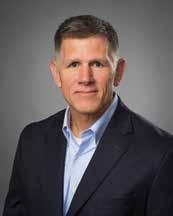
Touring the Museum of Antiquities
BY CLAUDE DUCLOUX
Before the fall of the Roman Empire, the poet Juvenal wrote a series of 16 satirical poems in five books, appropriately called the “Satires.” His essays had titles like “What Room is there For Genius?” and “The Dishonest and Dishonorable,” in which Juvenal commented on the foibles of society, covering everything from politics, power and social engagement. In his lament about the erosion of civic duty and public service, as power was passed to an already comfortable–and thus disengaged–populace, he created the phrase “Panem et Circenses” (Bread and Circuses). It described the “selfishness of the common people” who “abdicated their duties to be informed” and no longer require excellence or truth. Thus, all a Roman politician had to do to win their favor is keep them fed and, more importantly, entertained. And history always repeats itself.
SCENE: A metropolitan area, where three young tourists, TAD, PAT, and BROOKE find a dilapidated museum.
TAD: Hey, look at this old building! What do you think it is?
PAT: There’s a rusty plate on the front… it says E PLURIBUS UNUM.
BROOKE: What does that mean?
TAD: I think it’s French for “Dog Onions.”
BROOKE: No, I remember it has something to do with the former United States. Like a slogan.
TAD: Okay but what’s in the building? Is it open?
PAT: Hey guys, it is open. This sign says, Museum of …something called …the Rule of Law. Come on, let’s go in.
[An ancient GUIDE turns as he hears the front door creak open]
GUIDE: May I help you?
PAT: Uh. Well, are you open? We’d like to see what is in here.
GUIDE: Yes, we’re open. But few people care about the past.

Are you sure you want to come in?
TAD: Sure. Do you have a wine bar for the dog onions?
GUIDE: No, this is a memorial museum to a culture that lasted 250 years.
BROOKE: Wow, what happened? Earthquake? Plague?
GUIDE: No. The same thing that has happened to successful cultures throughout human history. Success led to boredom, greed, inattention, and then authoritarianism. Social failure inevitably followed.
PAT: So, … what is this Rule of Law stuff?
GUIDE: Follow me, I’ll show you around. Here is the chamber of Constitution. It’s where the people founded a country that would unite individual colonies with a central government under an agreement to be governed by the same rules, which applied to everyone.
TAD: Ha! … like that could work!
GUIDE: It actually worked very well for the most part.
BROOKE: Who was in charge of making sure everyone followed the rules?
GUIDE: Well, this society created a judiciary, which was bound by precedent.
PAT: “Precedent?” is that like a type of rope? We use rope to tie up heretics.
TAD: Yeah, they’re dangerous.
GUIDE: No, back then, precedent meant each generation of judges did their best to develop rights and interpretations of the law that built upon their decisions to harmonize them with the founder’s intent.
BROOKE: Harmonize? Judges sang?
GUIDE: No. Precedent helped other judges, lawyers and even citizens know what a law meant, and that saved everyone a lot of time.
BROOKE: But what if people needed a different meaning, could they hire their own judge?
GUIDE: Well, you’re getting ahead of me, but yes, that’s what happened.
TAD: You’d think that something
as important as selecting a big-time judge would have been reviewed by some sort of group of experts.
GUIDE: Indeed, young man! There were very vibrant committees of informed lawyers to review appointments, and they would give their opinions to the selectors on whether a candidate was qualified.
TAD: Then there were great judges every time?
GUIDE: Sadly, no. The people in charge only wanted one type of judge–a judge who would reliably rule for them. So, to avoid the determination that their nominees were unqualified, they abandoned those committees, and of course, demonized the committees as unfair.
PAT: But what about precedent? Wouldn’t that restrict decisions?
GUIDE: Well, it should have, but it didn’t. Anytime they needed to diverge from precedent, they made up new theories, like originalism, or that old decisions were simply obsolete. And they slowed
the appeal process to an unbearable crawl, which made continuity and predictability useless.
BROOKE: See, guys, how lucky we are nowadays that Supreme President makes all these decisions.
GUIDE: Well, how does your Supreme President get to the truth?
TAD: To the what?
GUIDE: The truth. The purpose of the legal system was to determine facts,… the true facts, and see how the law applied to those facts.
BROOKE: That’s boring. We don’t waste time anymore on that stuff.
PAT: Yeah, old man. Look here, we get the truth right here on our personal devices. Whatever comes on here is what we believe. Fast and convenient. Taa Daa!
GUIDE: Do you ever wonder if it’s correct?
TAD: No. Where have you been? It’s illegal to disagree. People who disagree are imprisoned, like they should be.
GUIDE: May I ask you a question? Does anyone study United States history anymore?
PAT: No, of course not. It’s all fake and made up.
GUIDE: Who says it’s all fake?
PAT: The Council of Truth. We’re not allowed to believe, or even question, their Sacred Book of Cofefe. I’m up to Chapter 7: Heroic Festival of January 6th.
GUIDE: Are any of you interested in verifying the truth?
BROOKE: No. Why should we? It’s just how life works nowadays. Actually, relying on the Book of Cofefe leaves a lot of time to go to circuses.
To my beloved colleagues. Please vote. I am so proud to be a lawyer. I am proud that our American legal profession strives for truth. I am proud that we are a source of analysis and informed opinion. Millions of our fellow Americans look to us for guidance and problem-solving. That makes us, undoubtedly, the most important profession in America right now.
We should pledge to use our skills of analysis and perspective, to analyze each candidate with the same dedication we give our clients. Does this candidate have
a reputation for seeking truth? What do people who worked with them say? Is this candidate’s vision for our future compatible with America’s expectation of rights and equal treatment?
Most importantly, if these questions trigger you with negative reaction, it is likely because the answers to that analysis make you uncomfortable about your choice.
As Polonius advised Hamlet, “To thine own self be true,” I’m hoping and praying that my wonderful colleagues will be true to the Rule of Law.
Keep the faith. AL
ADVERTISERS
Bank -
& Nicholas, Inc.
& Connelly, PLLC 5
5 33
Resolution Center 23
Global, LLP 4 Hargett Mediation - Reed, Claymon, Meeker & Hargett, PLLC 28
Auto Appraisers 31
Stephen Yelenosky 11
Holcomb, Callahan & Taylor 33



